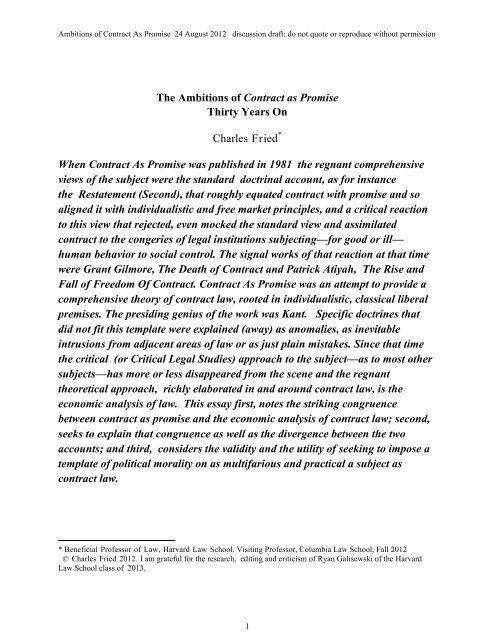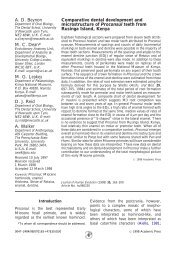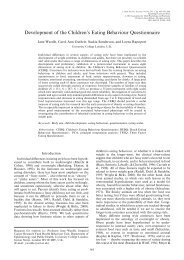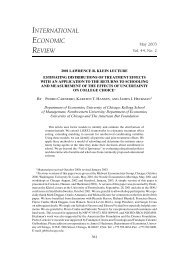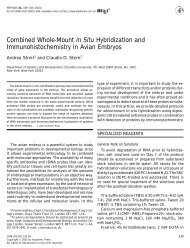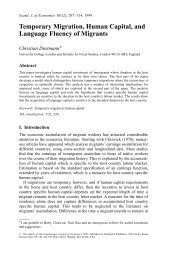The Ambitions of Contract as Promise Thirty Years On ... - UCL
The Ambitions of Contract as Promise Thirty Years On ... - UCL
The Ambitions of Contract as Promise Thirty Years On ... - UCL
Create successful ePaper yourself
Turn your PDF publications into a flip-book with our unique Google optimized e-Paper software.
<strong>Ambitions</strong> <strong>of</strong> <strong>Contract</strong> As <strong>Promise</strong> 24 August 2012 discussion draft: do not quote or reproduce without permission<br />
<strong>The</strong> <strong>Ambitions</strong> <strong>of</strong> <strong>Contract</strong> <strong>as</strong> <strong>Promise</strong><br />
<strong>Thirty</strong> <strong>Years</strong> <strong>On</strong><br />
Charles Fried *<br />
When <strong>Contract</strong> As <strong>Promise</strong> w<strong>as</strong> published in 1981 the regnant comprehensive<br />
views <strong>of</strong> the subject were the standard doctrinal account, <strong>as</strong> for instance<br />
the Restatement (Second), that roughly equated contract with promise and so<br />
aligned it with individualistic and free market principles, and a critical reaction<br />
to this view that rejected, even mocked the standard view and <strong>as</strong>similated<br />
contract to the congeries <strong>of</strong> legal institutions subjecting—for good or ill—<br />
human behavior to social control. <strong>The</strong> signal works <strong>of</strong> that reaction at that time<br />
were Grant Gilmore, <strong>The</strong> Death <strong>of</strong> <strong>Contract</strong> and Patrick Atiyah, <strong>The</strong> Rise and<br />
Fall <strong>of</strong> Freedom Of <strong>Contract</strong>. <strong>Contract</strong> As <strong>Promise</strong> w<strong>as</strong> an attempt to provide a<br />
comprehensive theory <strong>of</strong> contract law, rooted in individualistic, cl<strong>as</strong>sical liberal<br />
premises. <strong>The</strong> presiding genius <strong>of</strong> the work w<strong>as</strong> Kant. Specific doctrines that<br />
did not fit this template were explained (away) <strong>as</strong> anomalies, <strong>as</strong> inevitable<br />
intrusions from adjacent are<strong>as</strong> <strong>of</strong> law or <strong>as</strong> just plain mistakes. Since that time<br />
the critical (or Critical Legal Studies) approach to the subject—<strong>as</strong> to most other<br />
subjects—h<strong>as</strong> more or less disappeared from the scene and the regnant<br />
theoretical approach, richly elaborated in and around contract law, is the<br />
economic analysis <strong>of</strong> law. This essay first, notes the striking congruence<br />
between contract <strong>as</strong> promise and the economic analysis <strong>of</strong> contract law; second,<br />
seeks to explain that congruence <strong>as</strong> well <strong>as</strong> the divergence between the two<br />
accounts; and third, considers the validity and the utility <strong>of</strong> seeking to impose a<br />
template <strong>of</strong> political morality on <strong>as</strong> multifarious and practical a subject <strong>as</strong><br />
contract law.<br />
* Beneficial Pr<strong>of</strong>essor <strong>of</strong> Law, Harvard Law School. Visiting Pr<strong>of</strong>essor, Columbia Law School, Fall 2012<br />
© Charles Fried 2012. I am grateful for the research, editing and criticism <strong>of</strong> Ryan Galisewski <strong>of</strong> the Harvard<br />
Law School cl<strong>as</strong>s <strong>of</strong> 2013.<br />
1
<strong>Ambitions</strong> <strong>of</strong> <strong>Contract</strong> As <strong>Promise</strong> 24 August 2012 discussion draft: do not quote or reproduce without permission<br />
I.<br />
Recently I had occ<strong>as</strong>ion to reconsider not just the validity <strong>of</strong> particular<br />
arguments—for instance about consideration, the expectation me<strong>as</strong>ure <strong>of</strong><br />
damages, impossibility and frustration—I made over thirty years ago in <strong>Contract</strong><br />
<strong>as</strong> <strong>Promise</strong>, 1 but the value <strong>of</strong> the undertaking <strong>as</strong> a whole. 2 <strong>Contract</strong> <strong>as</strong> <strong>Promise</strong><br />
had <strong>as</strong> its overriding ambition connecting a number <strong>of</strong> salient doctrines <strong>of</strong> contract<br />
law to—indeed deriving them from—a central organizing moral and doctrinal<br />
principle: the promise principal. At the time in the late ’70s there were two views<br />
<strong>of</strong> the subject in the field: a traditional, doctrinal and not particularly theorized<br />
view that saw contract <strong>as</strong> the law’s way <strong>of</strong> allowing private parties to create<br />
and enforce the terms that would govern transactions and long-term<br />
undertakings, 3 and a burgeoning literature that saw contract law <strong>as</strong> a tool <strong>of</strong><br />
social control imposing obligations on parties growing in part, but only in part,<br />
from dealings into which they had voluntarily entered. Of course, it w<strong>as</strong> a<br />
commonplace that society gains from the exchange <strong>of</strong> goods and services—not<br />
only immediately <strong>as</strong> with barter, but over time <strong>as</strong> with the system <strong>of</strong> credit and the<br />
1 CHARLES FRIED, CONTRACT AS PROMISE: A THEORY OF CONTRACTUAL OBLIGATION (1981).<br />
2 <strong>The</strong> occ<strong>as</strong>ion w<strong>as</strong> an academic conference, “<strong>Contract</strong> <strong>as</strong> <strong>Promise</strong> at 30: <strong>The</strong> Future <strong>of</strong> <strong>Contract</strong> <strong>The</strong>ory.” <strong>The</strong><br />
papers have been published in volume 45, no. 3 <strong>of</strong> the SUFFOLK UNIVERSITY LAW REVIEW (2012). This<br />
essay h<strong>as</strong> grown out <strong>of</strong> my contribution to that volume. Charles Fried, <strong>Contract</strong> <strong>as</strong> <strong>Promise</strong> <strong>Thirty</strong> <strong>Years</strong> <strong>On</strong>, 45<br />
SUFFOLK U. L. REV. 961 (2012).<br />
3 <strong>The</strong> Restatement (Second) <strong>of</strong> <strong>Contract</strong>s, section 1 defines a contract <strong>as</strong> a “promise or a set <strong>of</strong> promises<br />
for the breach <strong>of</strong> which the law gives a remedy, or the performance <strong>of</strong> which the law in some way<br />
recognizes <strong>as</strong> a duty.”<br />
2
<strong>Ambitions</strong> <strong>of</strong> <strong>Contract</strong> As <strong>Promise</strong> 24 August 2012 discussion draft: do not quote or reproduce without permission<br />
stored value <strong>of</strong> money—and that therefore society w<strong>as</strong> justified, perhaps even<br />
obliged, not only to facilitate but to enforce the terms <strong>of</strong> such exchanges. But<br />
because promises are obligations freely chosen and undertaken, the <strong>as</strong>pect <strong>of</strong> social<br />
control on the traditional view w<strong>as</strong> mediated by and responsive to the voluntary<br />
undertakings <strong>of</strong> the parties.<br />
<strong>On</strong> the second view, the <strong>as</strong>pect <strong>of</strong> social control dominates—practically and<br />
theoretically. What we think <strong>of</strong> <strong>as</strong> contract law is in fact a system <strong>of</strong> government<br />
administration <strong>of</strong> the provision <strong>of</strong> goods and services—that present or future goods<br />
and services might in return be allocated to the providers is a possibility but not a<br />
foundational tenet. <strong>The</strong> government administrator (usually a judge) will make this<br />
allocation <strong>of</strong> burdens and benefits on a variety <strong>of</strong> criteria: the relative virtues <strong>of</strong> the<br />
parties before him, the value they have or will provide to the state, their needs and<br />
capacities, their connections to members <strong>of</strong> the government. And, <strong>of</strong> course, the<br />
judge may—or may not—take into account what the parties have set out <strong>as</strong> their<br />
arrangement going into the relationship and the effect that any decision may have<br />
on incentives to cooperate in the future. <strong>The</strong> more or less explicit mode <strong>of</strong><br />
deciding commercial and property disputes in the Soviet Union and the implicit but<br />
well understood method for resolving such disputes in the courts <strong>of</strong> contemporary<br />
China (and Russia) exemplify this system in action. (To be sure, <strong>as</strong> an instance <strong>of</strong><br />
3
<strong>Ambitions</strong> <strong>of</strong> <strong>Contract</strong> As <strong>Promise</strong> 24 August 2012 discussion draft: do not quote or reproduce without permission<br />
Rochefoucauld’s maxim that hypocrisy is the homage that vice pays to virtue, 4 the<br />
contemporary Chinese and Russian “legal” systems deploy the paraphernalia <strong>of</strong> the<br />
promissory system, but no party with the means and opportunity to address the real<br />
decision-makers and the factors that motivate them will omit to do so <strong>as</strong> effectively<br />
<strong>as</strong> possible.) Those who proclaim the superiority and sometimes the inevitability<br />
<strong>of</strong> the administrative model rarely embrace it in its full-blown form, preferring to<br />
see contract law <strong>as</strong> <strong>as</strong>similable to other, more frankly administrative legal regimes,<br />
or at le<strong>as</strong>t doctrines within such regimes.<br />
<strong>The</strong> signal work is Robert Lee Hale’s Coercion and Distribution in a<br />
Supposedly Non-Coercive State. 5 Hale placed the concepts <strong>of</strong> duress and coercion,<br />
which the promissory regime treats <strong>as</strong> anomalies calling for occ<strong>as</strong>ional ad hoc<br />
administrative intervention and correction, at the heart <strong>of</strong> all supposedly voluntary<br />
transactions, 6 and reconceptualized them <strong>as</strong> covert exercises <strong>of</strong> power and<br />
dominance, which the government (the courts) can either endorse or correct. 7 A<br />
later, less thoroughgoing variant sought to <strong>as</strong>similate contract law to tort, which is<br />
more readily conceived <strong>of</strong> <strong>as</strong> a regime for adjusting—on grounds <strong>of</strong> perceived<br />
4 FRANÇOIS DUC DE LA ROCHEFOUCAULD, MORAL MAXIMES 218<br />
5 38 POL. SCI. Q. 470 (1923).<br />
6 Hale’s focus is primarily on property rights and the power dynamics created by property, but his logic may readily<br />
be extrapolated to contract. See id. at 474.<br />
7 Id. at 471–72.<br />
4
<strong>Ambitions</strong> <strong>of</strong> <strong>Contract</strong> As <strong>Promise</strong> 24 August 2012 discussion draft: do not quote or reproduce without permission<br />
fairness, social utility or redistribution—the burdens arising out <strong>of</strong> involuntary<br />
encounters. 8 <strong>The</strong> promissory model w<strong>as</strong> <strong>as</strong>sociated with an individualistic ethos<br />
friendly to capitalism and free markets, the administrative one with a more<br />
socializing, communitarian ethos. <strong>The</strong> most prominent works in this genre were<br />
Grant Gilmore’s <strong>The</strong> Death <strong>of</strong> <strong>Contract</strong> 9 and Patrick Atiyah’s <strong>The</strong> Rise and<br />
Fall <strong>of</strong> Freedom <strong>of</strong> <strong>Contract</strong>. 10 Atiyah nicely captured the time’s anti-<br />
individualist and anti-capitalist tone:<br />
<strong>Promise</strong>-b<strong>as</strong>ed liability rests upon a belief in the<br />
traditional liberal values <strong>of</strong> free choice. Many still admire<br />
these values but they bring with them, inescapably, many<br />
other consequences which are today less admired,<br />
especially in England. <strong>The</strong>y bring, in particular, the<br />
recognition that some individuals are better equipped to<br />
exercise free choice than others, through natural aptitude,<br />
education, or the possession <strong>of</strong> wealth. And the greater<br />
is the scope for the exercise <strong>of</strong> free choice, the stronger is<br />
the tendency for these original inequalities to perpetuate<br />
themselves by maintaining or even incre<strong>as</strong>ing economic<br />
inequalities. 11<br />
Atiyah is particularly concerned to <strong>as</strong>sociate with these—he thinks—<br />
incre<strong>as</strong>ingly obsolete values <strong>of</strong> promise-b<strong>as</strong>ed contractual liability, the<br />
enforcement <strong>of</strong> purely executory contracts and a damage regime me<strong>as</strong>ured by<br />
8 See John C. P. Goldberg & Benjamin C. Zipursky, Seeing Tort Law from the Internal Point <strong>of</strong> View: Holmes and<br />
Hart on Legal Duties,75 FORDHAM L. REV. 1563, 1571 n. 34 (2006).<br />
9 GRANT GILMORE, THE DEATH OF CONTRACT (1974).<br />
10 P.S. ATIYAH, THE RISE AND FALL OF FREEDOM OF CONTRACT (1979). Atiyah did acknowledge the<br />
inevitability <strong>of</strong> using the expectation me<strong>as</strong>ure in contracts whose purpose w<strong>as</strong> the allocation <strong>of</strong> risks between the<br />
parties, but failed to see that most, if not all, contracts include exactly that purpose. See id. at 5.<br />
11 Id. at 6. This w<strong>as</strong> written before the Thatcher premiership.<br />
5
<strong>Ambitions</strong> <strong>of</strong> <strong>Contract</strong> As <strong>Promise</strong> 24 August 2012 discussion draft: do not quote or reproduce without permission<br />
the expectations that such contracts generate. To this purely promissory and<br />
forward-looking ground for contractual obligation, he contr<strong>as</strong>ts more<br />
sympathetic, backward-looking grounds <strong>of</strong> liability b<strong>as</strong>ed on the harm that a<br />
disappointed promisee suffered when he acted in reliance on the promise, or<br />
on the benefit that the disappointed promisee h<strong>as</strong> conferred on the faithless<br />
promisor. <strong>The</strong>se grounds <strong>of</strong> liability would cause contract law to disappear into<br />
the backward-looking grounds <strong>of</strong> tort and restitutionary liability, and that<br />
absorption <strong>of</strong> contract into tort w<strong>as</strong> just the thesis <strong>of</strong> Gilmore’s book. 12<br />
<strong>The</strong> socializing thrust <strong>of</strong> Hale’s, Gilmore’s and Atiyah’s critiques <strong>of</strong><br />
contract law w<strong>as</strong> also <strong>as</strong>sociated with the post-1960s and <strong>of</strong>ten Marxist-tinged<br />
avatar <strong>of</strong> legal realism, the critical legal studies movement. <strong>The</strong> critical legal<br />
theorists disputed, indeed mocked, the pretensions <strong>of</strong> standard contract doctrine<br />
<strong>as</strong> providing a neutral framework for discerning and implementing the terms <strong>of</strong><br />
agreements freely arrived at. <strong>The</strong>se scholars delighted in showing not only that<br />
these supposedly neutral doctrines were <strong>of</strong>ten contradictory and incoherent, but<br />
also that the real energy behind contract adjudication—<strong>as</strong> elsewhere in the law—<br />
w<strong>as</strong> provided by powerful forces implementing their social agend<strong>as</strong>. Those<br />
agend<strong>as</strong> depended on the interests <strong>of</strong> those in power and those whom they<br />
12 To the extent that the law <strong>of</strong> torts is more and more a law <strong>of</strong> insurance, it might be more apt to conclude that tort is<br />
being progressively absorbed into contract. See generally CHARLES FRIED & DAVID ROSENBERG, MAKING<br />
TORT LAW: WHAT SHOULD BE DONE AND WHO SHOULD DO (2003).<br />
6
<strong>Ambitions</strong> <strong>of</strong> <strong>Contract</strong> As <strong>Promise</strong> 24 August 2012 discussion draft: do not quote or reproduce without permission<br />
represented or with whom they made common cause. <strong>The</strong> signal work in this<br />
genre w<strong>as</strong> Duncan Kennedy’s Form and Substance in Private Law<br />
Adjudication. 13<br />
Against these intellectual and cultural themes, <strong>Contract</strong> <strong>as</strong> <strong>Promise</strong><br />
sought to <strong>as</strong>sert the coherence <strong>of</strong> standard contract doctrine <strong>as</strong> providing the<br />
structure by which actors could determine for themselves the terms <strong>of</strong> their<br />
interaction and cooperation—whether in commercial or in personal relations.<br />
<strong>The</strong> thesis w<strong>as</strong> avowedly moralizing. It w<strong>as</strong> b<strong>as</strong>ed on a morality <strong>of</strong> autonomy,<br />
respect for persons and trust. <strong>Promise</strong> is a kind <strong>of</strong> moral invention: it allows<br />
persons to create obligation where there w<strong>as</strong> none before, and thus it gives free<br />
individuals a facility for extending their reach by enlisting the reliable<br />
collaboration <strong>of</strong> other free persons. That we must not harm one another and<br />
that we must fulfill the terms <strong>of</strong> special relationships that may not have been <strong>of</strong><br />
our choosing are moral obligations that are laid upon us. <strong>The</strong> obligation <strong>of</strong> a<br />
promise we lay upon ourselves. To be sure, this remarkable feature <strong>of</strong> promises<br />
can be trivialized by saying that the obligation <strong>of</strong> the institution <strong>of</strong> promising<br />
precede any particular promissory obligations we may <strong>as</strong>sume; but the fact<br />
remains that until we invoke the institution and do so with the very purpose <strong>of</strong><br />
activating its obligations, those distinct obligations do not exist. It is a<br />
13 Duncan Kennedy, Form and Substance in Private Law Adjudication, 89 HARV. L. REV. 1685 (1976).<br />
7
<strong>Ambitions</strong> <strong>of</strong> <strong>Contract</strong> As <strong>Promise</strong> 24 August 2012 discussion draft: do not quote or reproduce without permission<br />
remarkable feature <strong>of</strong> the institution that what before w<strong>as</strong>—or may have<br />
been 14 —morally indifferent or optional becomes nonoptional, and it becomes<br />
nonoptional because we want it to be so <strong>as</strong> a way <strong>of</strong> achieving our purposes.<br />
This is not to say that promissory obligation in general does not have its<br />
roots in deeper moral soil. <strong>The</strong> institution, <strong>as</strong> such, is not an invention ex nihilo.<br />
It depends on the deeper morality <strong>of</strong> trust and respect for persons. It is an<br />
institution, like language, that allows us to accomplish an infinite variety <strong>of</strong><br />
ends. But the efficacy <strong>of</strong> language depends on a morality <strong>of</strong> truth telling. If<br />
communications had no more than a random relation to the truth, language<br />
would be useless to accomplish its (our) ends. Truthfulness depends on trust,<br />
and trust on a morality <strong>of</strong> mutual respect. Trust may be (mis)characterized <strong>as</strong><br />
merely providing a more or less secure prediction <strong>of</strong> another’s future behavior.<br />
(“Trust him to lie, cheat and steal if he thinks he can get away with it.”) But<br />
trust allows a particular kind <strong>of</strong> prediction, coordination and collaboration b<strong>as</strong>ed<br />
on a recursive and transparent mirroring <strong>of</strong> mutual recognition and respect.<br />
We start with respect, which allows trust, which allows language, which finally<br />
14 I qualify here because it is quite possible that a person may unintentionally incur an obligation to<br />
another by acting in such a way that that the other person h<strong>as</strong> come to rely on him, such that he is<br />
obliged to avoid the harm that would be caused by the disappointment <strong>of</strong> that reliance. But that is<br />
not a promise. See FRIED, supra note 1, at 9-14. Compare Thom<strong>as</strong> Scanlon and his principle L.<br />
T.M. Scanlon, <strong>Promise</strong>s and <strong>Contract</strong>s, in THE THEORY OF CONTRACT LAW: NEW ESSAYS<br />
86, 92 (Peter Benson ed., 2001).<br />
8
<strong>Ambitions</strong> <strong>of</strong> <strong>Contract</strong> As <strong>Promise</strong> 24 August 2012 discussion draft: do not quote or reproduce without permission<br />
allows the institution <strong>of</strong> promising. In each step along the way our moral<br />
powers are amplified, <strong>as</strong> if each raised to a higher power the moral capacity<br />
<strong>of</strong> the one before. And, <strong>as</strong> I said in <strong>Contract</strong> <strong>as</strong> <strong>Promise</strong>, what starts <strong>as</strong> a means<br />
for enlarging human purposes becomes—perhaps only adverbially—an end in<br />
itself: it is desirable to attain our ends by the route <strong>of</strong> trust and promising,<br />
even if we could get there, and quite innocently, just <strong>as</strong> well without them. 15<br />
II.<br />
<strong>Thirty</strong> years later, the intellectual f<strong>as</strong>hion that provoked <strong>Contract</strong> <strong>as</strong><br />
<strong>Promise</strong> h<strong>as</strong> faded from prominence. In its place h<strong>as</strong> arisen a vibrant,<br />
voluminous and <strong>of</strong>ten intricate literature <strong>of</strong>fering alternative accounts and<br />
justifications for what might be called the cl<strong>as</strong>sical law <strong>of</strong> contract. Indeed, the<br />
economic analysis <strong>of</strong> law may today be the dominant intellectual approach to<br />
legal institutions generally and to contract law in particular. <strong>The</strong> law-and-<br />
economics movement certainly shares nothing <strong>of</strong> the nihilistic and anti–<br />
freemarket dispositions <strong>of</strong> the critical legal studies movement. Work in the<br />
economic analysis <strong>of</strong> contract law genre takes two closely related forms: one<br />
neutrally analytical, one normative. <strong>The</strong> analytical takes <strong>as</strong> its premise that<br />
15 FRIED, supra note 1, at 16-17; see also Seana Valentine Shiffrin, Paternalism, Unconscionability Doctrine,<br />
and Accommodation, 29 PHIL. & PUB. AFF. 205, 221 (2000); JOHN RAWLS, A THEORY OF JUSTICE:<br />
REVISED EDITION, ch. IX, <strong>The</strong> Good <strong>of</strong> Justice, 450 (1971).<br />
9
<strong>Ambitions</strong> <strong>of</strong> <strong>Contract</strong> As <strong>Promise</strong> 24 August 2012 discussion draft: do not quote or reproduce without permission<br />
rational actors seek to maximize their long-term advantage and will prefer legal<br />
arrangements that facilitate its attainment. In respect to contract, its institutions<br />
may be analyzed either <strong>as</strong> serving this disposition <strong>of</strong> the contracting parties or,<br />
if they do not, <strong>as</strong> serving the interests <strong>of</strong> some other cl<strong>as</strong>s <strong>of</strong> actors orbeing<br />
irrational. 16 <strong>The</strong> normative law-and-economics account starts with a premise<br />
quite dissimilar to that embraced by <strong>Contract</strong> <strong>as</strong> <strong>Promise</strong>: the law should be<br />
designed to allow people in a voluntary relationship to structure that<br />
relationship in the way that they judge will best serve their interests over the<br />
long run. 17 Respect for the autonomy <strong>of</strong> individuals requires that they be treated<br />
<strong>as</strong> the best judges <strong>of</strong> their own interests. This premise builds on several<br />
background premises that also accord with <strong>Contract</strong> <strong>as</strong> <strong>Promise</strong>: for instance,<br />
that the arrangement does not impose on third parties costs that those third<br />
parties have any moral right to complain about 18 ; that the contracting individuals<br />
16 For a concise and incisive statement <strong>of</strong> the economic point <strong>of</strong> view and a sharp critique <strong>of</strong> <strong>Contract</strong><br />
<strong>as</strong> <strong>Promise</strong>, see Richard Cr<strong>as</strong>well, <strong>Contract</strong> Law, Default Rules, and the Philosophy <strong>of</strong> Promising, 88<br />
MICH. L. REV. 489 (1989) [hereinafter Cr<strong>as</strong>well, Default Rules].<br />
17 Pr<strong>of</strong>essor Cr<strong>as</strong>well argues, for example, that the point <strong>of</strong> law generally is enhancing social welfare, not by<br />
moral force but by facilitating investment in, and exchange <strong>of</strong>, better products and services; and contract law<br />
improves the quality <strong>of</strong> contract <strong>as</strong> a “product” in this sense. Richard Cr<strong>as</strong>well, <strong>Promise</strong>s and Prices, 45<br />
SUFFOLK U. L. REV. 735, 738–39, 776 (2012). Daniel Markovits and Alan Schwartz justify expectation<br />
damages <strong>as</strong> the most likely to encourage the maximization <strong>of</strong> economic surplus, while George Triantis and Juliet<br />
Kostritsky question whether the expectation damage remedy truly reflects the choice <strong>of</strong> many contracting parties.<br />
See Daniel Markovits & Alan Schwartz, <strong>The</strong> Expectation Remedy and the Promissory B<strong>as</strong>is <strong>of</strong> <strong>Contract</strong>, 45<br />
SUFFOLK U. L. REV. 799 (2012); George Triantis, Promissory Autonomy, Imperfect Courts, and the Immorality<br />
<strong>of</strong> the Expectation Default Remedy, 45 SUFFOLK U. L. REV. 827 (2012); Juliet P. Kostritsky, <strong>The</strong> <strong>Promise</strong><br />
Principle and <strong>Contract</strong> Interpretation, 45 SUFFOLK U. L. REV. 843 (2012).<br />
18 For instance, if Dick and Jane agree to enter into an intimate relationship, this may cause<br />
10
<strong>Ambitions</strong> <strong>of</strong> <strong>Contract</strong> As <strong>Promise</strong> 24 August 2012 discussion draft: do not quote or reproduce without permission<br />
are ordinarily competent judges <strong>of</strong> their own welfare; and that neither individual<br />
h<strong>as</strong> been forced or deceived into entering the relationship. Most distinctive for<br />
both the law and economics analysis <strong>of</strong> contracts and the morality <strong>of</strong> promising<br />
that underlies <strong>Contract</strong> <strong>as</strong> <strong>Promise</strong> is the <strong>as</strong>sumption that individuals (promising<br />
or contracting) have a certain persistence <strong>as</strong> entities over time—what an<br />
individual chooses for his future he is choosing for himself and not for another<br />
person who will just happen to have the same name and DNA; and what he gets<br />
by that choice he may not complain <strong>of</strong> <strong>as</strong> if it had been chosen for him by<br />
someone else. 19<br />
Law and economics analysis is avowedly utilitarian and proceeds from a<br />
premise <strong>of</strong> consumer sovereignty or subjective me<strong>as</strong>ure <strong>of</strong> welfare, 20 while<br />
<strong>Contract</strong> <strong>as</strong> <strong>Promise</strong> is Kantian and more or less takes its cue from Kant’s <strong>The</strong><br />
considerable pain to Dick’s disappointed rival, but it is not an effect the rival h<strong>as</strong> any moral right to<br />
complain <strong>of</strong>. And more generally, disappointed rivals in a fair competition have no moral title to<br />
complain. <strong>The</strong>re are exceptions to these generalities, <strong>as</strong> well <strong>as</strong> disputes about what constitutes fair<br />
competition, but the law ought to attempt to reflect these understandings <strong>as</strong> best <strong>as</strong> it can.<br />
19 This l<strong>as</strong>t premise h<strong>as</strong> been a concern <strong>of</strong> mine since writing An Anatomy <strong>of</strong> Values. CHARLES<br />
FRIED, AN ANATOMY OF VALUES: PROBLEMS OF PERSONAL AND SOCIAL CHOICE, ch..<br />
10, at 155 (1970). It takes on an institutional character in Saying What the Law Is. CHARLES<br />
FRIED, SAYING WHAT THE LAW IS: THE CONSTITUTION IN THE SUPREME COURT 6-10<br />
(2004). It is the subject <strong>of</strong> the pr<strong>of</strong>ound work <strong>of</strong> Derek Parfit. <strong>The</strong> recent development <strong>of</strong> what h<strong>as</strong><br />
come to be known <strong>as</strong> behavioral law and economics may be understood <strong>as</strong> questioning the premises <strong>of</strong><br />
rationality and continuity. <strong>On</strong>e is left wondering what the normative—<strong>as</strong> opposed to the purely<br />
descriptive—entailments <strong>of</strong> this move might be: a kind <strong>of</strong> paternalism for sure, but me<strong>as</strong>ured by what<br />
metric? See, e.g., Richard Thaler & C<strong>as</strong>s Sunstein, Libertarian Paternalism, 93 AM. ECON. REV. 175<br />
(2003) (arguing for a “libertarian paternalism” that preserves “free” choice but creates situations in<br />
which individuals are subtly pressured to make the “right” choice).<br />
20 See, e.g., LOUIS KAPLOW & STEVEN SHAVELL, FAIRNESS VERSUS WELFARE (2002); RICHARD<br />
POSNER, ECONOMIC ANALYSIS OF LAW 15-20 (8th ed. 2011).<br />
11
<strong>Ambitions</strong> <strong>of</strong> <strong>Contract</strong> As <strong>Promise</strong> 24 August 2012 discussion draft: do not quote or reproduce without permission<br />
Metaphysical Elements <strong>of</strong> Justice. 21 That the two should arrive at similar<br />
conclusions on many <strong>of</strong> the main points <strong>of</strong> contract doctrine 22 is striking.<br />
Differences come to the fore when the issue is the effect <strong>of</strong> social arrangements<br />
on the overall welfare <strong>of</strong> groups, 23 <strong>as</strong> opposed to the joint welfare <strong>of</strong> two<br />
contracting parties. <strong>The</strong> convergence is particularly salient in the design <strong>of</strong><br />
institutions that facilitate the coordination, through agreements, <strong>of</strong> the energies<br />
<strong>of</strong> otherwise independent persons. Legal regimes by their nature are concerned<br />
with institutional design, and both the Kantian and utilitarian perspectives focus<br />
on maximizing the preferences <strong>of</strong> individuals ex ante; that is, the two<br />
perspectives focus on the design <strong>of</strong> legal regimes and doctrines that<br />
collaborating individuals would themselves see <strong>as</strong> furthering the purposes they<br />
hope to achieve in their free collaboration. <strong>The</strong>re may be regret ex post, but the<br />
Kantian perspective makes the individual responsible for his own regret; the<br />
21 IMMANUEL KANT, THE METAPHYSICAL ELEMENTS OF JUSTICE (John Ladd trans., <strong>The</strong> Bobbs-<br />
Merrill Co., 2d ed. 1999) (1797).<br />
22 <strong>The</strong> strongest and most comprehensive statement <strong>of</strong> this convergence, from which I have drawn wisdom<br />
andencouragement, is Jody S. Kraus, <strong>The</strong> Correspondence <strong>of</strong> <strong>Contract</strong> and <strong>Promise</strong>, 109 COLUM. L. REV. 1603,<br />
1633–34 (2009) [hereinafter Kraus, Correspondence]. See also Jody S. Kraus, Philosophy <strong>of</strong> <strong>Contract</strong> Law, in<br />
THE OXFORD HANDBOOK OF JURISPRUDENCE AND PHILOSOPHY OF LAW 687 (Jules Coleman & Scott<br />
Shapiro eds., 2002).<br />
Tort law is another matter. I had made a less comprehensive attempt at addressing the moral foundations<br />
<strong>of</strong> tort law in Right and Wrong (1978) and An Anatomy <strong>of</strong> Values (1970). In Making Tort Law: What Should Be<br />
Done and Who Should Do It (2003) (with David Rosenberg), our analysis and conclusions over a large range <strong>of</strong><br />
topics coincided with those <strong>of</strong> the economic analysis <strong>of</strong> the subject.<br />
23 See RAWLS, supra note 15, §§ 5-6.<br />
12
<strong>Ambitions</strong> <strong>of</strong> <strong>Contract</strong> As <strong>Promise</strong> 24 August 2012 discussion draft: do not quote or reproduce without permission<br />
premise <strong>of</strong> continuity and its entailment <strong>of</strong> self-respect require an individual to<br />
be willing to make commitments into the future, and the corollary <strong>of</strong> respect for<br />
others requires him to abide by those commitments made to others. <strong>The</strong> famous<br />
example is Kant’s discussion <strong>of</strong> lying, and especially the lying promise. 24 Kant’s<br />
test <strong>of</strong> universalization—would you be willing to propose the maxim <strong>of</strong> your<br />
action (i.e., the principle on which you act) <strong>as</strong> a universal law?—is quite<br />
congruent with the method <strong>of</strong> law and economics, which <strong>as</strong>ks whether a rule <strong>of</strong><br />
(contract) law is one that rational parties would accept ex ante to govern the<br />
arrangements on which they plan to embark.<br />
That both the Kantian ethics <strong>of</strong> respect and the economic analysis <strong>of</strong> law<br />
concern themselves with general rules and proceed ex ante (i.e., before the<br />
parties know how a particular undertaking will work out) ensures that the two<br />
methods arrive at similar, if not identical conclusions. 25 Utilitarianism and<br />
Kantian ethics diverge when they advise a particular person how she should<br />
behave ex post; Kantian ethics and <strong>Contract</strong> <strong>as</strong> <strong>Promise</strong> require that a promising<br />
(or contracting) party obey the rules she embraced ex ante. But since the<br />
economic analysis <strong>of</strong> legal rules is an analysis <strong>of</strong> legal rules, it rarely diverges<br />
24<br />
IMMANUEL KANT, GROUNDWORK OF THE METAPHYSICS OF MORALS 97 (H.J. Paton trans., Harper<br />
Perennial 2009).<br />
25<br />
As John Rawls many times and in many places h<strong>as</strong> acknowledged: the decision procedure by which<br />
individuals choose principles to govern their mutual interaction behind a veil <strong>of</strong> ignorance is very<br />
much like Kant’s formula: “Act only according to that maxim whereby you can, at the same time,<br />
will that it should become a universal law.” See RAWLS, supra note 15, § 40.<br />
13
<strong>Ambitions</strong> <strong>of</strong> <strong>Contract</strong> As <strong>Promise</strong> 24 August 2012 discussion draft: do not quote or reproduce without permission<br />
with Kantian ethics in this way. <strong>The</strong> way in which a divergence between the<br />
two might arise shows just how tight their convergence on this point is. Imagine<br />
a dispute in which the issue is inequality <strong>of</strong> bargaining power—for instance,<br />
where a consumer knowingly signs a standard contract containing a clause<br />
requiring that disputes be submitted to arbitration. <strong>The</strong>re are those who hope<br />
the judge in a hard c<strong>as</strong>e will find some form <strong>of</strong> words to explain ruling for the<br />
more sympathetic party, even though no rule <strong>of</strong> law honestly applied would<br />
permit this. 26 Perhaps a utilitarian might applaud such judicial (mis)conduct, but<br />
the economic analysis <strong>of</strong> law and <strong>Contract</strong> <strong>as</strong> <strong>Promise</strong> would both insist that<br />
some rule re<strong>as</strong>onably applicable to all like c<strong>as</strong>es be available to justify the<br />
ruling. <strong>The</strong>y would both agree with Antonio in <strong>The</strong> Merchant <strong>of</strong> Venice:<br />
<strong>The</strong> duke cannot deny the course <strong>of</strong> law,<br />
For the commodity that strangers have<br />
With us in Venice, if it be denied,<br />
Will much impeach the justice <strong>of</strong> the state,<br />
Since that the trade and pr<strong>of</strong>it <strong>of</strong> the city<br />
Consisteth <strong>of</strong> all nations. 27<br />
III.<br />
26 See, e.g., Broemmer v. Abortion Servs. <strong>of</strong> Phx., Ltd., 840 P.2d 1013 (Ariz. 1992) (refusing to enforce an<br />
“adhesion contract”); Richards v. Richards, 513 N.W.2d 118 (Wis. 1997) (refusing to enforce a contract that w<strong>as</strong><br />
“void <strong>as</strong> against public policy”). This supposed divergence mirrors the well-known difference between act and rule<br />
utilitarianism and the controversy whether rule breaking can ever in the long run be truly for the best.<br />
27 WILLIAM SHAKESPEARE, THE MERCHANT OF VENICE act 3, sc. 3 (Jay L. Halio ed., Clarendon Press<br />
1993) (1600).<br />
14
<strong>Ambitions</strong> <strong>of</strong> <strong>Contract</strong> As <strong>Promise</strong> 24 August 2012 discussion draft: do not quote or reproduce without permission<br />
Of particular interest is the large body <strong>of</strong> literature that claims to find a<br />
divergence between standard contract doctrine and <strong>Contract</strong> <strong>as</strong> <strong>Promise</strong>, in so<br />
far <strong>as</strong> <strong>Contract</strong> <strong>as</strong> <strong>Promise</strong> purports to derive contract doctrine <strong>as</strong> comporting<br />
with, and indeed issuing from Kantian moral premises. (<strong>The</strong> largest quarrel<br />
<strong>Contract</strong> <strong>as</strong> <strong>Promise</strong> h<strong>as</strong> with standard doctrine is in the latter’s doctrine <strong>of</strong><br />
consideration.) <strong>The</strong>re have been two strands in these critiques. Both strands<br />
insist that standard doctrine diverges from <strong>Contract</strong> <strong>as</strong> <strong>Promise</strong>, but they take<br />
opposite tacks. Utilitarian-minded economic critics complain that <strong>Contract</strong> <strong>as</strong><br />
<strong>Promise</strong> is unsuccessful in accounting in its own moralizing terms for a number<br />
<strong>of</strong> important and practically sound contract doctrines—particularly the<br />
expectation me<strong>as</strong>ure <strong>of</strong> damages and the related rule requiring the victim <strong>of</strong> a<br />
breach to make efforts to mitigate his own damages. If promise really were at the<br />
heart <strong>of</strong> contract, then a promisor would be held to perform his exact<br />
undertaking—perhaps by a decree <strong>of</strong> specific performance or by the imposition <strong>of</strong><br />
punitive damages. But instead, contract doctrine and <strong>Contract</strong> <strong>as</strong> <strong>Promise</strong> allow<br />
the party in breach to “get away” with paying “only” the value <strong>of</strong> the expected<br />
performance. 28 Economists claim this shows that the law is more practical than<br />
moral: the law recognizes that a less rigid rule promotes social utility by<br />
28 RESTATEMENT (SECOND) OF CONTRACTS § 347 (1981).<br />
15
<strong>Ambitions</strong> <strong>of</strong> <strong>Contract</strong> As <strong>Promise</strong> 24 August 2012 discussion draft: do not quote or reproduce without permission<br />
encouraging a promisor to make the highest and best use <strong>of</strong> his resources, while<br />
awarding the disappointed promisee a money equivalent no greater than the worth<br />
<strong>of</strong> the promised performance. This is the much-mooted argument for the efficient<br />
breach. Related to efficient breach is the doctrine <strong>of</strong> mitigation. Economic<br />
critics <strong>of</strong> <strong>Contract</strong> <strong>as</strong> <strong>Promise</strong> have been known to argue that if the moral<br />
obligation <strong>of</strong> promise really were the b<strong>as</strong>is <strong>of</strong> contract, then insult would not be<br />
added to injury—<strong>as</strong> it is in standard doctrine 29 —by requiring that the victim <strong>of</strong><br />
the breach extend himself to minimize the damage that the promisor h<strong>as</strong> caused<br />
him.<br />
<strong>The</strong>se same instances are deployed against <strong>Contract</strong> <strong>as</strong> <strong>Promise</strong> by those<br />
who criticize standard contract doctrine <strong>as</strong> insufficiently faithful to the morality<br />
<strong>of</strong> promise and <strong>as</strong> meretriciously swayed by (merely) economic arguments to<br />
loosen the rigors <strong>of</strong> promissory morality. <strong>The</strong>y fault <strong>Contract</strong> <strong>as</strong> <strong>Promise</strong> for<br />
being untrue to its own moral premises by apologizing for these departures<br />
from what promissory morality requires. <strong>The</strong> leading critic along these lines is<br />
Seana Shiffrin, who concludes her important article, <strong>The</strong> Divergence <strong>of</strong> <strong>Contract</strong><br />
and <strong>Promise</strong>, 30 by suggesting that the prevalence <strong>of</strong> expectation damages and the<br />
29 Id. § 350.<br />
30 Seana Valentine Shiffrin, <strong>The</strong> Divergence <strong>of</strong> <strong>Contract</strong> and <strong>Promise</strong>, 120 HARV. L. REV. 708 (2007)<br />
[hereinafter Shiffrin, Divergence]. Contra Kraus, Correspondence, supra note 22.<br />
16
<strong>Ambitions</strong> <strong>of</strong> <strong>Contract</strong> As <strong>Promise</strong> 24 August 2012 discussion draft: do not quote or reproduce without permission<br />
doctrine <strong>of</strong> efficient breach “may play a role in creating a wider culture in which<br />
pressure develops not to comply with the moral commitment, whether just<br />
because it is not legally required or because the legal permission spawns cultural<br />
habits that render moral compliance precious or alien.” 31 Thus, she calls to mind<br />
a theme sounded by Atiyah, except that Atiyah celebrates what Shiffrin<br />
deplores. 32<br />
Both the moral criticism and the economic defense <strong>of</strong> expectation damages<br />
persuade me that I had overstated the c<strong>as</strong>e for the connection between the<br />
promise principle and expectation damages:<br />
If I make a promise to you, I should do <strong>as</strong> I promise; and if I fail to keep<br />
my promise, it is fair that I should be made to hand over the equivalent<br />
<strong>of</strong> the promised performance. In contract doctrine this proposition appears<br />
<strong>as</strong> the expectation me<strong>as</strong>ure <strong>of</strong> damages for breach. <strong>The</strong> expectation<br />
standard gives the victim <strong>of</strong> a breach no more or less than he would have<br />
had had there been no breach—in other words, he gets the benefit <strong>of</strong> his<br />
bargain. 33<br />
Here is the standard example used to illustrate the theory <strong>of</strong> efficient<br />
breach and to justify the expectation me<strong>as</strong>ure <strong>of</strong> damages:<br />
31 Shiffrin, Divergence, supra note 30, at 740.<br />
32 See supra note 11 and accompanying text.<br />
33 FRIED, supra note 1, at 17. <strong>The</strong> endnote quotes the Restatement (First) <strong>of</strong> <strong>Contract</strong>s § 329, cmt.<br />
a, (1932): “In awarding compensatory damages, the effort is made to put the injured party in <strong>as</strong> good<br />
a position <strong>as</strong> that in which he would have been put by full performance <strong>of</strong> the contract . . . .” <strong>The</strong> note<br />
also cites Charles J. Goetz & Robert E. Scott, Enforcing <strong>Promise</strong>s: An Examination <strong>of</strong> the B<strong>as</strong>is <strong>of</strong><br />
<strong>Contract</strong>s, 89 YALE L.J. 1261 (1980).<br />
17
<strong>Ambitions</strong> <strong>of</strong> <strong>Contract</strong> As <strong>Promise</strong> 24 August 2012 discussion draft: do not quote or reproduce without permission<br />
Seller contracts to manufacture and deliver 14 gross <strong>of</strong> custom widgets to<br />
Buyer for $10 a gross for use <strong>as</strong> a necessary component in Buyer’s unique<br />
gizmos. Just prior to the date <strong>of</strong> delivery Third Party <strong>of</strong>fers Seller $25 a<br />
gross for immediate delivery to him <strong>of</strong> the widgets. Buyer will have to<br />
pay $15 a gross for the widgets from another manufacturer and will lose<br />
$5 in lost sales for each gross <strong>as</strong> a result <strong>of</strong> the delay.<br />
Economists re<strong>as</strong>on that Seller should sell the widgets to Third Party and<br />
pay Buyer the $5-per-gross difference in the price <strong>of</strong> the replacement widgets<br />
plus the $5 per gross in lost gizmo sales. Buyer will be no worse <strong>of</strong>f<br />
financially than if Seller had faithfully performed, while Seller will be $5 per<br />
gross better <strong>of</strong>f, which is roughly equivalent to the additional value to<br />
society created by Third Party receiving the early delivery <strong>of</strong> the widgets—<br />
the extra value exists because Third Party valued the widgets more than<br />
Buyer. Seller’s move, compared to exact performance <strong>as</strong> promised, is not only<br />
Kaldor-Hicks optimal, in that there is a greater sum total <strong>of</strong> welfare, but also<br />
Pareto optimal, because none <strong>of</strong> the three is worse <strong>of</strong>f and Seller and Third<br />
Party are better <strong>of</strong>f. <strong>The</strong> rule is thus socially optimal because resources are<br />
directed without loss to their highest and best use.<br />
Apart from Seana Shiffrin’s concern that the efficient breach enabled by<br />
the expectation me<strong>as</strong>ure fosters a culture <strong>of</strong> faithless opportunism, there is the<br />
objection raised by several contracts scholars 34 that the advantage reaped by the<br />
34 See Richard Cr<strong>as</strong>well, <strong>Contract</strong> Remedies, Renegotiation, and the <strong>The</strong>ory <strong>of</strong> Efficient Breach, 61 S.<br />
18
<strong>Ambitions</strong> <strong>of</strong> <strong>Contract</strong> As <strong>Promise</strong> 24 August 2012 discussion draft: do not quote or reproduce without permission<br />
defaulting promisor (the $5 per gross in my example) really belongs to the<br />
promisee—Buyer and not the faithless Seller. This objection may be restated<br />
in terms that call to mind Kant’s treatment <strong>of</strong> promises in <strong>The</strong> Metaphysical<br />
Elements <strong>of</strong> Justice: by promising, I give a notional property interest in my<br />
promised performance to the promisee. 35 And, <strong>of</strong> course, once viewed in<br />
property terms, any surplus would rightfully belong to the promisee. 36 Indeed,<br />
that is the legal regime that obtains in respect to contracts for the sale <strong>of</strong> real<br />
property, the standard buyer’s remedy being specific performance.<br />
But this line <strong>of</strong> argument founders—or at le<strong>as</strong>t begs the question—if one<br />
considers that, after all, if the promisor is “m<strong>as</strong>ter <strong>of</strong> the bargain” and the whole<br />
moral c<strong>as</strong>e is built on respect for the promisor’s autonomy, then the promisor<br />
should be able to specify not only the substantive terms but also what the<br />
CAL. L. REV. 629, 640-42 (1988) [hereinafter Cr<strong>as</strong>well, <strong>Contract</strong> Remedies]; Daniel Friedmann, <strong>The</strong><br />
Efficient Breach Fallacy, 18 J. LEGAL STUD. 1, 13-18 (1989). Avery Katz’s contribution to the<br />
symposium takes an original approach to the problem <strong>of</strong> efficient breach. He notes that the payment<br />
<strong>of</strong> money damages in lieu <strong>of</strong> performance ought to satisfy deontological concerns in most c<strong>as</strong>es, but<br />
wonders whether it makes sense to valorize, in pursuit <strong>of</strong> a virtuous (rather than a moral) society, the<br />
kind <strong>of</strong> promises that can be so satisfied. Avery Katz, Virtue Ethics and Efficient Breach, 45<br />
SUFFOLK. U. L. REV. 777 (2012).<br />
35 KANT, supra note 21, §§ 20-21.<br />
36 <strong>The</strong> analysis is more plausible <strong>as</strong> one considers that the promisee can always sell his right to<br />
performance, and thus this issue boils down to who captures the surplus. This is illustrated by the<br />
leading c<strong>as</strong>e <strong>of</strong> Groves v. John Wunder Co., 286 N.W. 235 (Minn. 1939) (remedy for failure to perform<br />
promise to improve land w<strong>as</strong> cost <strong>of</strong> obtaining similar performance, over $60,000, not difference in<br />
value <strong>of</strong> land, only $12,160). “After the decision the c<strong>as</strong>e w<strong>as</strong> compromised and defendant paid $55,000<br />
in a c<strong>as</strong>h settlement.” Dawson, Harvey, Henderson & Baird, <strong>Contract</strong>s: C<strong>as</strong>es and Comments (9 th ed.<br />
2008).<br />
19
<strong>Ambitions</strong> <strong>of</strong> <strong>Contract</strong> As <strong>Promise</strong> 24 August 2012 discussion draft: do not quote or reproduce without permission<br />
bargain is worth in the event <strong>of</strong> default. Shiffrin’s objection thus implies that a<br />
promisor should (morally) not be free to specify the remedy for his default, and<br />
that substance is for the parties to specify and remedy for the state (and<br />
morality) to determine, can be gotten around by explicitly c<strong>as</strong>ting the promise in<br />
option terms. It would certainly be an odd kind <strong>of</strong> moral rigorism to allow<br />
freedom <strong>of</strong> contract to reign <strong>as</strong> to “substance” but to rule out option<br />
contracts. 37 And several commentators have pointed out that, <strong>as</strong> between<br />
sophisticated bargainers, the choice <strong>of</strong> damages from among the full range <strong>of</strong><br />
consequences—from relatively small stipulated damages 38 to specific<br />
performance, and perhaps even to supercompensatory liquidated damages—will<br />
be reflected in the price that the promisee pays at the outset. 39 <strong>The</strong> law does, it<br />
must be admitted, take Shiffrin’s side to the extent that such remedial<br />
specification is subject to greater scrutiny and control by the courts than are<br />
substantive terms. Supercompensatory damages clauses may be struck down <strong>as</strong><br />
37 Indeed, Shiffrin herself works through the conceptual difficulty that the remedy affects the content <strong>of</strong> a promise—<br />
that a contractual promise, which includes for the promisor an effective legal option to perform <strong>as</strong> promised or pay<br />
expectation damages, is best characterized <strong>as</strong> a promise to perform or pay expectation damages. Shiffrin,<br />
Divergence, supra note 30, at 727–29.<br />
38 Such contracts are quite familiar: a contract for sale or for services that limits the remedy to a small<br />
sum—say the forfeiture <strong>of</strong> a deposit—but not so small that the law would treat the bargain <strong>as</strong> illusory.<br />
39 See Cr<strong>as</strong>well, <strong>Contract</strong> Remedies, supra note 34, at 632; Markovits & Schwartz, supra note , at 813.<br />
20
<strong>Ambitions</strong> <strong>of</strong> <strong>Contract</strong> As <strong>Promise</strong> 24 August 2012 discussion draft: do not quote or reproduce without permission<br />
penalties, 40 and undercompensatory provisions struck down <strong>as</strong> unconscionable. 41<br />
But it is hard to see how such limitations—at le<strong>as</strong>t <strong>as</strong> applied to sophisticated<br />
parties—accord with the general principles <strong>of</strong> freedom <strong>of</strong> contract and party<br />
autonomy. As Judge Richard Posner, citing Goetz & Scott, 42 h<strong>as</strong> said:<br />
Deep <strong>as</strong> the hostility to penalty clauses runs in the<br />
common law, . . . we still might be inclined to question, if we<br />
thought ourselves free to do so, whether a modern court<br />
should refuse to enforce a penalty clause where the signator is<br />
a substantial corporation, well able to avoid improvident<br />
commitments. Penalty clauses provide an earnest <strong>of</strong><br />
performance. . . .<br />
A better argument is that a penalty clause may<br />
discourage efficient <strong>as</strong> well <strong>as</strong> inefficient breaches <strong>of</strong> contract.<br />
. . .<br />
<strong>On</strong> this view, since compensatory damages should be<br />
sufficient to deter inefficient breaches (that is, breaches that<br />
cost the victim more than the gain to the contract breaker),<br />
penal damages could have no effect other than to deter some<br />
efficient breaches. But this overlooks the earlier point that the<br />
willingness to agree to a penalty clause is a way <strong>of</strong> making the<br />
promisor and his promise credible and may therefore be<br />
essential to inducing some value-maximizing contracts to be<br />
made. It also overlooks the more important point that the<br />
parties (always <strong>as</strong>suming they are fully competent) will, in<br />
deciding whether to include a penalty clause in their contract,<br />
40 See U.C.C. § 2-718(1) (1977) (“A term fixing unre<strong>as</strong>onably large liquidated damages is void <strong>as</strong> a<br />
penalty.”); Cr<strong>as</strong>well, <strong>Contract</strong> Remedies, supra note 34, at 637-38 see also RESTATEMENT (FIRST)<br />
OF CONTRACTS § 339 (1932).<br />
41 U.C.C. § 2-718 cmt. 1 (“An unre<strong>as</strong>onably small amount . . . might be stricken under the section on<br />
unconscionable contracts or clauses.”).<br />
42 Charles J. Goetz & Robert E. Scott, Liquidated Damages, Penalties and the Just Compensation<br />
Principle: Some Notes on an Enforcement Model and a <strong>The</strong>ory <strong>of</strong> Efficient Breach, 77 COLUM. L.<br />
REV. 554 (1977).<br />
21
<strong>Ambitions</strong> <strong>of</strong> <strong>Contract</strong> As <strong>Promise</strong> 24 August 2012 discussion draft: do not quote or reproduce without permission<br />
weigh the gains against the costs—costs that include the<br />
possibility <strong>of</strong> discouraging an efficient breach somewhere<br />
down the road—and will include the clause only if the benefits<br />
exceed those costs <strong>as</strong> well <strong>as</strong> all other costs.<br />
<strong>On</strong> this view the refusal to enforce penalty clauses is (at<br />
best) paternalistic—and it seems odd that courts should display<br />
parental solicitude for large corporations. 43<br />
What remains <strong>of</strong> Shiffrin’s point, I think, is that there is in this re<strong>as</strong>oning<br />
the danger <strong>of</strong> an infinite regress: if the remedy may be stipulated ad lib in the<br />
contract, what <strong>of</strong> the promisor’s failure to comply with that second-order,<br />
remedial obligation? At some point, the law must step in and enforce the<br />
contract; and in doing so, it must take account <strong>of</strong> the costs imposed by the<br />
faithless promisor not only on his counterparty but also on the judicial system and<br />
the regime <strong>of</strong> confidence in contracts in general.<br />
It is, <strong>of</strong> course, the c<strong>as</strong>e that many, perhaps most, contracts do not<br />
specify remedies in the event <strong>of</strong> breach. Indeed, all contracts fail to specify the<br />
parties’ intentions in respect to many matters that ex ante seem quite remote<br />
and, at any rate, not worth spelling out. So courts are regularly called upon to<br />
fill in details that only ex post may loom large. This is a t<strong>as</strong>k that <strong>Contract</strong> <strong>as</strong><br />
<strong>Promise</strong> discussed under the term “gaps”: “<strong>The</strong> gaps cannot be filled, the<br />
43 Lake River Corp. v. Carborundum Co., 769 F.2d 1284, 1288-89 (7th Cir. 1985).<br />
22
<strong>Ambitions</strong> <strong>of</strong> <strong>Contract</strong> As <strong>Promise</strong> 24 August 2012 discussion draft: do not quote or reproduce without permission<br />
adjustments cannot be governed, by the promise principle.” 44 This statement<br />
<strong>as</strong>sumes that the parties to a promise understand each other perfectly about some<br />
things which are governed by the promise principle, but are in doubt or lack any<br />
intention or have conflicting intentions <strong>as</strong> to other things. But language and<br />
intentions are not like that. <strong>The</strong>re are implications that come to awareness only<br />
when they arise, and the parties may recognize and acknowledge them or deny<br />
and disavow them—in good faith or bad. <strong>Contract</strong> <strong>as</strong> <strong>Promise</strong>, from its too-<br />
rigid premise, drew the conclusion that since the promise principle did not apply<br />
outside the sharply drawn boundary <strong>of</strong> perfectly understood agreement,<br />
questions <strong>of</strong> interpretation, mistake and frustration can only be solved by<br />
recourse to other principles imposed on the parties but nevertheless gathered<br />
under the rubric <strong>of</strong> contract. <strong>The</strong> most convincing contemporary literature (and it<br />
h<strong>as</strong> grown very large) analyzes the specification <strong>of</strong> remedial regimes <strong>as</strong> a<br />
question <strong>of</strong> f<strong>as</strong>hioning appropriate default rules that the courts will impute unless<br />
the parties specify otherwise. In this way, the voluntary nature <strong>of</strong> contractual<br />
obligation is preserved, in part, by the reality that the imposition <strong>of</strong> default<br />
rules ab extra is not unavoidable, and also by the fiction that the imputed<br />
default rules closely approximate what the parties expect and desire. 45 <strong>The</strong><br />
44 FRIED, supra note 1, at 69.<br />
45 Richard Cr<strong>as</strong>well, in his magisterial and coruscating essay, distinguishes between background rules,<br />
23
<strong>Ambitions</strong> <strong>of</strong> <strong>Contract</strong> As <strong>Promise</strong> 24 August 2012 discussion draft: do not quote or reproduce without permission<br />
canonical expectancy rule is thus justified not <strong>as</strong> a necessary implication <strong>of</strong> the<br />
promise principle, but <strong>as</strong> a default rule: the rule that most contracting parties<br />
would choose (a majoritarian default rule) 46 ; or <strong>as</strong> the rule most likely to reach<br />
efficient results along the lines <strong>of</strong> the doctrine <strong>of</strong> efficient breach 47 ; or, most<br />
subtly, <strong>as</strong> whatever rule is most likely to force the parties to consider, reveal<br />
and jointly adopt the regime they actually prefer. 48 (So if the waivable<br />
default rule were that a breaching party must contribute his gains to the Red<br />
Cross, this consequence would focus the minds <strong>of</strong> both promisor and<br />
promisee and cause them to negotiate to their mutually agreed optimum<br />
solution.)<br />
Critics <strong>of</strong> <strong>Contract</strong> <strong>as</strong> <strong>Promise</strong> also point to the rule requiring the victim<br />
<strong>of</strong> a breach to make re<strong>as</strong>onable efforts—the expense <strong>of</strong> which is to be charged<br />
to the party in breach—to mitigate his damages. So if the victim is a seller, he<br />
must try to find an alternative buyer, charging the repudiating buyer the<br />
which may be altered by the parties—these are the default rules—and background rules, which the<br />
parties may not wiave or alter. Cr<strong>as</strong>well, Default Rules, supra note 16.<br />
46 See Ian Ayres & Robert Gertner, Filling Gaps in Incomplete <strong>Contract</strong>s: An Economic <strong>The</strong>ory <strong>of</strong><br />
Default Rules, 99 YALE L.J. 87, 93 (1989); Cr<strong>as</strong>well, supra note 17, at 759, 763.<br />
47 POSNER, supra note 20, at 118-19.<br />
48 See Richard Cr<strong>as</strong>well, Offer, Acceptance, and Efficient Reliance, 48 STAN. L. REV. 481, 487 (1996); Robert<br />
Gertner & Ian Ayres, Filling Gaps in Incomplete <strong>Contract</strong>s: An Economic <strong>The</strong>ory <strong>of</strong> Default Rules, 99 YALE L.J.<br />
87, 91 (1989) (“Penalty defaults are designed to give at le<strong>as</strong>t one party to the contract an incentive to contract around<br />
the default rule and therefore to choose affirmatively the contract provision they prefer.”).<br />
24
<strong>Ambitions</strong> <strong>of</strong> <strong>Contract</strong> As <strong>Promise</strong> 24 August 2012 discussion draft: do not quote or reproduce without permission<br />
difference. 49 Critics argue correctly that this rule cannot be deduced <strong>as</strong> a<br />
corollary <strong>of</strong> the promise principle. Some, who are hostile to the promise<br />
principle, argue that the mitigation rule shows that <strong>Contract</strong> <strong>as</strong> <strong>Promise</strong> is<br />
wrong to <strong>as</strong>sert that the promise principle underlies contract law. Others, who<br />
see contract law <strong>as</strong> insufficiently faithful to the promise principle, argue that the<br />
mitigation rule adds insult to injury by requiring the morally innocent injured<br />
party to take the initiative in salving his own wounds. <strong>The</strong> way <strong>Contract</strong> <strong>as</strong><br />
<strong>Promise</strong> deals with the duty to mitigate is to treat it <strong>as</strong> another rule collected for<br />
convenience under the rubric <strong>of</strong> contract, although it is in fact imposed on the<br />
victim willy-nilly, not to affect his preferences, but to avoid a w<strong>as</strong>te <strong>of</strong><br />
resources (<strong>as</strong> with efficient breach) or require a kind <strong>of</strong> altruism that is good for<br />
the soul. Recent scholarship quite re<strong>as</strong>onably identifies this <strong>as</strong> another default<br />
rule, which contracting parties can and regularly do reverse. Unlike expectancy<br />
<strong>as</strong> the default damage me<strong>as</strong>ure, it is not plausible to argue that contract law is<br />
simply choosing—for the convenience <strong>of</strong> the parties—the rule that they would<br />
have chosen had they thought about it. <strong>The</strong> moralists are more likely to be<br />
right in seeing <strong>as</strong> more natural a “you broke it, you fix it” default. <strong>The</strong><br />
mitigation rule is quite well supported, however, on efficiency grounds: the<br />
49 RESTATEMENT (SECOND) OF CONTRACTS § 350 (1981); U.C.C. §§ 2-706 (1977).<br />
25
<strong>Ambitions</strong> <strong>of</strong> <strong>Contract</strong> As <strong>Promise</strong> 24 August 2012 discussion draft: do not quote or reproduce without permission<br />
disappointed promisee is more likely to know what will best remedy the<br />
difficulties into which the breach h<strong>as</strong> plunged him, and requiring him to take the<br />
initiative—though not at his own expense—is the best way to avoid a dead-<br />
weight loss.<br />
IV.<br />
Alan Schwartz and Robert Scott have considered at length another way in<br />
which the law <strong>of</strong> contracts seems to diverge from what an institution single-<br />
mindedly determined by the promise principle might look like. 50 As h<strong>as</strong> many<br />
times been observed, the promise principle h<strong>as</strong> a strong affinity to what h<strong>as</strong> been<br />
called the will theory <strong>of</strong> contract, according to which the state’s imposition <strong>of</strong><br />
contractual liability is justified <strong>as</strong> a matter <strong>of</strong> political morality by the fact that<br />
the obligation is self-imposed. It is the supposed departure from fidelity to these<br />
premises by features <strong>of</strong> the standard contract law <strong>of</strong> damages that moralists like<br />
Shiffrin deplore and skeptics about the role <strong>of</strong> morality in law celebrate.<br />
Schwartz and Scott investigate a seeming divergence which goes much more to<br />
the heart <strong>of</strong> these premises. <strong>The</strong>y point to doctrines that systematically decline<br />
to b<strong>as</strong>e legal liability on the fullest, most accurate inquiry into what the parties<br />
50 Alan Schwartz & Robert E. Scott, <strong>Contract</strong> Interpretation Redux, 119 YALE L.J. 926 (2010) [herinafter Schwartz<br />
& Scott, Redux]. This article builds on an earlier article. Alan Schwartz & Robert E. Scott, <strong>Contract</strong> <strong>The</strong>ory and<br />
<strong>The</strong> Limits <strong>of</strong> <strong>Contract</strong> Law, 113 YALE L.J. 541 (2003) [hereinafter Schwartz & Scott, <strong>Contract</strong> <strong>The</strong>ory]. It should<br />
be noted that the authors limit their analysis to contracts between business firms.<br />
26
<strong>Ambitions</strong> <strong>of</strong> <strong>Contract</strong> As <strong>Promise</strong> 24 August 2012 discussion draft: do not quote or reproduce without permission<br />
really intended (willed). 51 <strong>The</strong>y point to them and leave us to conclude that if<br />
these doctrines do not accord with some moral theory (mine, for instance?) then<br />
so much the worse for that theory. Consider the rule that treats an agreement <strong>as</strong><br />
fully integrated if from within its “four corners” the written agreement h<strong>as</strong> the<br />
look and feel <strong>of</strong> an integrated agreement, and the parole evidence rule that<br />
excludes prior or contemporaneous evidence that may suggest that the parties<br />
meant something more or different from what they have written down. Such<br />
doctrines would seem to violate both freedom <strong>of</strong> and freedom from contract.<br />
And predictably, promissory rigorists deplore <strong>as</strong> overly formalistic the textualist<br />
preferences <strong>of</strong> these doctrines. 52 <strong>The</strong> rejection <strong>of</strong> these rules is <strong>as</strong>sociated with<br />
the scholar A. L. Corbin 53 , the jurist Roger Traynor, 54 the Restatement<br />
(Second) 55 and the U.C.C. 56 (<strong>The</strong>re is an irony here: Corbin is <strong>as</strong>sociated with<br />
51 E.g., Schwartz & Scott, <strong>Contract</strong> <strong>The</strong>ory, supra note 50, 585–85 (majority-language linguistic default), id. at 590–<br />
91 (parol evidence rule); see also Schwartz & Scott, Redux, supra note 50, at 945–46 (noting that parties will<br />
contract with these default rules in mind, thereby decre<strong>as</strong>ing incorrect interpretations).<br />
52 See the discussion in Jody S. Kraus & Robert E. Scott, <strong>Contract</strong> Design and the Structure <strong>of</strong> <strong>Contract</strong>ual Intent,<br />
84 NYU L. REV. 1023, 1046-48 (2009). Of course I doi not suggest that either Kraus or Scott are promissory<br />
rigorists.<br />
53 E.g., Arthur L. Corbin, <strong>The</strong> Interpretation <strong>of</strong> Words and the Parol Evidence Rule, 50 CORNELL L.Q. 161 (1965).<br />
54 See Pacific G<strong>as</strong> & Elec. Co. v. G. W.Thom<strong>as</strong> Drayage & Rigging Co., 442 P.2d 641, 645 (1968) (“[R]ational<br />
interpretation requires at le<strong>as</strong>t a preliminary consideration <strong>of</strong> all credible evidence <strong>of</strong>fered to prove the intention <strong>of</strong><br />
the parties.”).<br />
55 RESTATEMENT (SECOND) OF CONTRACTS § 201 cmt. b (1981) (“[T]he question <strong>of</strong> meaning in c<strong>as</strong>es <strong>of</strong><br />
misunderstanding depends on an inquiry into what each party knew or had re<strong>as</strong>on to know.”); id. § 209 (permitting<br />
introduction <strong>of</strong> extrinsic evidence in order to make a preliminary determination <strong>of</strong> whether an agreement is<br />
completely integrated and the parol evidence rule applies).<br />
27
<strong>Ambitions</strong> <strong>of</strong> <strong>Contract</strong> As <strong>Promise</strong> 24 August 2012 discussion draft: do not quote or reproduce without permission<br />
the antiformalist realist school, while formalism is <strong>as</strong>sociated with Williston,<br />
who is in turn <strong>as</strong>sociated with the will theory <strong>of</strong> contracts.)<br />
Schwartz and Scott deftly untangle this skein <strong>of</strong> apparent contradictions in<br />
a way that bears a similarity to what I have suggested above in respect to<br />
remedies doctrine. 57 Parties considering the matter ex ante will <strong>of</strong>ten have<br />
re<strong>as</strong>on to limit what evidence a court may look to in determining what were their<br />
contractual intentions. For instance, trials in which all evidence that may bear<br />
on the question <strong>of</strong> what were the parties true intentions, trials in which the full<br />
truth <strong>of</strong> their states <strong>of</strong> mind is plumbed, would in most c<strong>as</strong>es be long and costly.<br />
<strong>The</strong> four corners and parol evidence rules, in addition to limiting introduction <strong>of</strong><br />
mounds <strong>of</strong> evidence, <strong>of</strong>ten allow a decision on summary judgment.<br />
Furthermore, since extrinsic evidence <strong>of</strong> intention is <strong>of</strong>ten ambiguous and/or<br />
contradictory, limiting what the judge and trier <strong>of</strong> fact may look to gives the<br />
parties greater <strong>as</strong>surance against surprising and anomalous decisions by<br />
decision-makers with unexpected dislikes and predilections.<br />
But this argument stinks in the nostrils <strong>of</strong> those who view contract <strong>as</strong> a<br />
moral institution and courts <strong>as</strong> instruments in the search for truth; on such a<br />
view, considerations <strong>of</strong> cost and efficiency are no more appropriate in the<br />
56 U.C.C. §§ 2-202, 2-208 (2003).<br />
57 See Schwartz & Scott, <strong>Contract</strong> <strong>The</strong>ory, supra note 50, at 587–90.<br />
28
<strong>Ambitions</strong> <strong>of</strong> <strong>Contract</strong> As <strong>Promise</strong> 24 August 2012 discussion draft: do not quote or reproduce without permission<br />
adjudication <strong>of</strong> contract claims than they would be in settling upon the best<br />
interpretation <strong>of</strong> a work by Bach or Shakespeare. Truth and justice are<br />
examples, <strong>as</strong> Michael Sandel would have it, <strong>of</strong> What Money Can’t Buy. 58 Just <strong>as</strong><br />
money—perhaps accompanied by an appeal to the theory <strong>of</strong> efficient breach—<br />
shouldn’t be allowed to buy you out <strong>of</strong> a promise you should be bound to keep,<br />
so the content <strong>of</strong> a promise is not what at a later time it seems efficient to prove,<br />
but the full truth <strong>of</strong> what you have pledged to perform. And if the limited truth <strong>of</strong><br />
the original promise is exactly what you have bargained for, and if the written<br />
word and no more is all you want enforced, is it not odd that—in the name <strong>of</strong><br />
your will, in the name <strong>of</strong> honoring bargains—you disregard these limits? <strong>The</strong><br />
confused dist<strong>as</strong>te for arbitration displays some <strong>of</strong> this same incoherent moral<br />
rigorism: “people should keep their word, dammit, and no mere arbitrator should<br />
be able to get between a court <strong>of</strong> law and the deep down <strong>as</strong>certainment <strong>of</strong><br />
whether a person is welching on his bargain.” But what if the arbitrator is part<br />
<strong>of</strong> that bargain? Moreover, Schwartz and Scott show that they are not efficiency<br />
fanatics: what they propose—whether it be the four-corners rule or the parol<br />
evidence rule—are not categorical imperatives; they are defaults—mere<br />
58 See generally MICHAEL SANDEL, WHAT MONEY CAN’T BUY: THE MORAL LIMITS OF MARKETS<br />
(2012).<br />
29
<strong>Ambitions</strong> <strong>of</strong> <strong>Contract</strong> As <strong>Promise</strong> 24 August 2012 discussion draft: do not quote or reproduce without permission<br />
defaults. 59 <strong>The</strong>ir theory depends on the will <strong>of</strong> the parties in that they provide<br />
parties with a choice <strong>of</strong> interpretive strategy; under their system, if you don’t<br />
want a formalist contract, don’t have one. 60 Or, you can have <strong>as</strong> much <strong>of</strong> one <strong>as</strong><br />
you want. In contr<strong>as</strong>t, the opposite <strong>of</strong> formalism or textualism—let’s call it<br />
purposivism 61 —leaves the parties no such choice <strong>of</strong> interpretivist strategies. In<br />
short, if you don’t want a formalist contract, don’t have one. Or have <strong>as</strong> much <strong>of</strong><br />
one <strong>as</strong> you want. For Schwartz & Scott, the only role that a predilection for<br />
efficiency plays is to stipulate formalism <strong>as</strong> a default. But once you see the<br />
choice between purposivism and formalism <strong>as</strong> a choice, one or the other h<strong>as</strong> to<br />
be the default when the parties don’t choose, and Schwartz and Scott make a<br />
pretty good argument that, at le<strong>as</strong>t between merchants, formalism is what most<br />
would choose—it is a majoritarian default rule. 62<br />
But there is another problem <strong>of</strong> an infinite regress, one we have<br />
encountered in respect to remedies, but in the problem <strong>of</strong> interpretation it goes<br />
deeper: what if one party insists that from the outset—ex ante—he had rejected<br />
formalism? How is that dispute to be adjudicated? (<strong>The</strong>re is an analogous crux<br />
59 See Schwartz & Scott, Redux, supra note 50, at 946–47.<br />
60 Id. at 947.<br />
61 This is a bit <strong>of</strong> naughtiness on my part. I mean to draw an analogy between textualists in statutory interpretation<br />
and their counterparties who are called purposivists. See, e.g., John F. Manning, Textualism and the Equity <strong>of</strong> the<br />
Statute, 101 COLUM. L. REV. 1, 3–5 (2001).<br />
62 See Schwartz & Scott, <strong>Contract</strong> <strong>The</strong>ory, supra note 50, at 568–69.<br />
30
<strong>Ambitions</strong> <strong>of</strong> <strong>Contract</strong> As <strong>Promise</strong> 24 August 2012 discussion draft: do not quote or reproduce without permission<br />
in respect to arbitration agreements, and whether the agreement to submit to<br />
arbitration is subject to arbitration.) After all, my argument depends on the<br />
premise that there is agreement—at le<strong>as</strong>t by default—to this higher-order rule<br />
about agreement. I am quite clear that this dispute must be adjudicated by the<br />
state on extrinsic grounds <strong>of</strong> political morality. How could it be otherwise? To<br />
take from Wittgenstein in another context, at some point we hit bedrock and our<br />
spade is turned. 63 At some point agreement between the parties, b<strong>as</strong>ed only on<br />
the limited set <strong>of</strong> interactions leading up to the contract, runs out. Or perhaps<br />
this is analogous to Weber’s definition <strong>of</strong> the state <strong>as</strong> having the monopoly <strong>of</strong><br />
coercive force.<br />
But how, then, is that dispute (over which style <strong>of</strong> interpretation to be<br />
used) to be adjudicated? It is standard doctrine that the parol evidence rule, the<br />
four-corners rule and the like have no application to certain claims <strong>of</strong> fraud: for<br />
instance imagine a purported obligee on a written instrument who claims that he<br />
w<strong>as</strong> tricked into thinking that he w<strong>as</strong> just signing his autograph. <strong>The</strong> law might<br />
take the line that the signer did at le<strong>as</strong>t voluntarily sign his name and that signing<br />
your name is an act so fraught with potential consequences that if you<br />
voluntarily do that, you must take on special burdens—either <strong>of</strong> pro<strong>of</strong> if the<br />
63 LUDWIG WITTGENSTEIN, PHILOSOPHICAL INVESTIGATIONS 217, at 91 e (G.E.M. Anscombe trans.,<br />
Wiley Blackwell, 4th ed. 2009) (1953).<br />
31
<strong>Ambitions</strong> <strong>of</strong> <strong>Contract</strong> As <strong>Promise</strong> 24 August 2012 discussion draft: do not quote or reproduce without permission<br />
claimant is the obligor, or <strong>of</strong> re<strong>as</strong>onable care if the claimant is an innocent third<br />
party, <strong>as</strong> for instance a holder in due course. But these are not arguments about<br />
real, though second-order, agreement; they are arguments about the efficiency or<br />
fairness <strong>of</strong> various benefits and burdens, or about the proper allocation <strong>of</strong> social<br />
resources in adjudicating disputes. Imagine the extreme c<strong>as</strong>e in which the<br />
purported obligee insists that it is not his signature on the document at all, that it<br />
is a forgery. <strong>The</strong>re are burdens <strong>of</strong> pro<strong>of</strong>, evidentiary rules and limits to how<br />
much time a court will devote to resolving the issue. <strong>The</strong>se procedural rules can<br />
be made to look like Schwartz and Scott’s arguments about interpretive rules;<br />
but such agreement on background procedural matters is hypothetical, the kind<br />
that Robert Nozick h<strong>as</strong> written are not worth the paper they are not written on.<br />
<strong>The</strong> two can be brought closer together, <strong>as</strong> in c<strong>as</strong>es <strong>of</strong> what are called fraud not<br />
in the execution but in the inducement. <strong>The</strong> victim <strong>of</strong> the fraud does not claim,<br />
for instance, that he w<strong>as</strong> told that he w<strong>as</strong> just giving his autograph (the rest <strong>of</strong> the<br />
document artfully folded over). Rather he makes the more attenuated claim that<br />
he w<strong>as</strong> led to believe that this mortgage agreement is just a formality necessary<br />
to obtain a loan on quite different terms. Scott and Schwartz carefully confine<br />
their argument to agreements between business people—what the UCC calls<br />
agreements between merchants—where the majoritarian default rule with<br />
32
<strong>Ambitions</strong> <strong>of</strong> <strong>Contract</strong> As <strong>Promise</strong> 24 August 2012 discussion draft: do not quote or reproduce without permission<br />
considerable plausibility may be taken to be a rule <strong>of</strong> actual, second-order<br />
agreement. And in general, it is not possible to escape, even in the most<br />
throughgoingly subjective regime, the possibility <strong>of</strong> error and therefore the<br />
necessity <strong>of</strong> a rule that <strong>as</strong>signs the risks <strong>of</strong> such error without ultimate recourse<br />
to the parties’ actual agreement. This is the notion <strong>of</strong> state and law writ not large<br />
but small.<br />
V.<br />
Randy Barnett in <strong>Contract</strong> Is Not <strong>Promise</strong>; <strong>Contract</strong> Is Consent 64 and A<br />
Consent <strong>The</strong>ory <strong>of</strong> <strong>Contract</strong>, 65 goes much further on the textualist front. He<br />
argues that contract law not only favors formality and writing in agreements<br />
among merchants, <strong>as</strong> noted by Schwartz and Scott, but that the whole fabric <strong>of</strong><br />
contract law is woven on the warp and wo<strong>of</strong> <strong>of</strong> objectivity. 66 If, <strong>as</strong> <strong>Contract</strong> <strong>as</strong><br />
<strong>Promise</strong> insists, promise is morally binding because it is the willing invocation<br />
by a free moral agent <strong>of</strong> a convention that allows him to bind his will, 67 and if<br />
promise were indeed the moral and political b<strong>as</strong>is for contract law, <strong>as</strong><br />
64 Randy E. Barnett, <strong>Contract</strong> Is Not <strong>Promise</strong>; <strong>Contract</strong> Is Consent, 45 SUFFOLK U. L. Rev. 647 (2012).<br />
65 Randy E. Barnett, A Consent <strong>The</strong>ory <strong>of</strong> <strong>Contract</strong>, 86 COLUM. L. REV. 269 (1986).<br />
66 See id. at , 302–03. Learned Hand wrote that the objective meaning binds the parties, even “were it<br />
proved by twenty bishops that either party, when he used the words, intended something else than the<br />
usual meaning which the law imposes upon them.” Hotchkiss v. Nat’l City Bank <strong>of</strong> N.Y., 200 F. 287,<br />
293 (S.D.N.Y. 1911). See also RESTATEMENT (SECOND) OF CONTRACTS, § 2 cmt. b<br />
(1981).<br />
67 FRIED, supra note 1, at 7-17.<br />
33
<strong>Ambitions</strong> <strong>of</strong> <strong>Contract</strong> As <strong>Promise</strong> 24 August 2012 discussion draft: do not quote or reproduce without permission<br />
<strong>Contract</strong> <strong>as</strong> <strong>Promise</strong> also insists, then there should be no contractual liability for<br />
what the promisor’s words would ordinarily be taken to mean in c<strong>as</strong>es<br />
where the promisor had in fact meant something quite different. <strong>The</strong><br />
prevailing objective doctrine shows, Barnett argues, that it is not promise but<br />
consent that is the underlying moral and political b<strong>as</strong>is for contract law. It<br />
cannot be gainsaid that what h<strong>as</strong> been called the will theory, to which <strong>as</strong> I have<br />
said <strong>Contract</strong> <strong>as</strong> <strong>Promise</strong> bears a close affinity, is incompatible with holding a<br />
promisor to the objective meaning <strong>of</strong> his words. <strong>The</strong> practical, economic and<br />
utilitarian grounds for holding him to his words are obvious. And so is the<br />
moral argument that, <strong>as</strong> between the promisor who did not mean what his<br />
words plainly meanand the promisee who took him at his word, the former<br />
should—<strong>as</strong> in any accident—bear the cost <strong>of</strong> the harm he h<strong>as</strong> caused. But these<br />
are not promissory, will-theory arguments. 68<br />
Barnett marks this divergence between contract and promise not<br />
just within but at the very threshold <strong>of</strong> contract. <strong>The</strong>re are many<br />
promises in which the promisor does not intend, and cannot re<strong>as</strong>onably be<br />
understood <strong>as</strong> intending, to be legally bound. 69 A moral rigorist might deny the<br />
requirement <strong>of</strong> this meta-intention, just <strong>as</strong> she might deny the validity <strong>of</strong> meta-<br />
68 Accord Shiffrin, Divergence, supra note 30, at 752–53.<br />
69 See Leonard v. Pepsico, Inc., 88 F. Supp. 2d 116, 127–28 (S.D.N.Y. 1999).<br />
34
<strong>Ambitions</strong> <strong>of</strong> <strong>Contract</strong> As <strong>Promise</strong> 24 August 2012 discussion draft: do not quote or reproduce without permission<br />
intentions regarding remedies, re<strong>as</strong>oning thus: a promise creates a moral<br />
obligation that is other-regarding—it creates a moral duty to another, and the<br />
promisor h<strong>as</strong> no moral business denying the promisee the ability to enforce that<br />
obligation. This is indeed similar to the objections to contractual clauses limiting<br />
the remedy to the forfeiture <strong>of</strong> a small deposit or requiring arbitration before a<br />
religious panel. But just <strong>as</strong> I have argued that parties may, and by a morality<br />
<strong>of</strong> autonomy should, be able to agree not just <strong>as</strong> to the substantive terms <strong>of</strong><br />
the promise but also <strong>as</strong> to its remedial implications, so that same morality<br />
requires, and the law (largely) agrees, that the parties may specify whether they<br />
want their promise to be legally cognizable at all. But Barnett points out that<br />
even this threshold question is determined on the b<strong>as</strong>is <strong>of</strong> objective appearance,<br />
so that whether you are taken to have entered the contractual room at all, and so<br />
will be made to play by the rules <strong>of</strong> contract law, is not entirely a function <strong>of</strong> your<br />
will either. And from this he concludes that not promise but consent is the b<strong>as</strong>is<br />
<strong>of</strong> contract. This is how he put it in a recent essay:<br />
[C]ourts should presumptively enforce private commitments<br />
when there exists a manifested intention to create a legal<br />
relation. . . . [T]o determine the prima facie c<strong>as</strong>e <strong>of</strong> contract,<br />
we should determine whether there w<strong>as</strong> a manifested intention<br />
to be legally bound. I refer to this criterion, in short, <strong>as</strong><br />
consent. 70<br />
70 Barnett, supra note 64, at 655 (emph<strong>as</strong>is in original).<br />
35
<strong>Ambitions</strong> <strong>of</strong> <strong>Contract</strong> As <strong>Promise</strong> 24 August 2012 discussion draft: do not quote or reproduce without permission<br />
This does not solve but merely reproduces the puzzle posed by the<br />
objective theory <strong>of</strong> contract. Whether promise or consent is taken to be central<br />
to contract, there are occ<strong>as</strong>ions on which contractual liability is<br />
imposed (or denied) in contradiction to the actual will <strong>of</strong> one <strong>of</strong> the parties. 71<br />
Switching from promise to consent invokes a different terminology, perhaps less<br />
individualistic and more wholesale, <strong>as</strong> in the presumed consent to be governed by<br />
the laws <strong>of</strong> a re<strong>as</strong>onably just polity in which we all participate and whose<br />
benefits we take. And like the general duty to obey the laws <strong>of</strong> such a polity, so<br />
the objective theory is a practical necessity. What Barnett’s consent theory<br />
does—much in the way <strong>of</strong> social contract theory—is to suggest the fairness <strong>of</strong><br />
holding someone to legal obligations imposed by a regime with which—in one<br />
way or another, by his own actions—he h<strong>as</strong> become enmeshed.<br />
<strong>The</strong> law <strong>of</strong> contract is, after all, a practical institution involving lawyers,<br />
judges, documents and third parties who make investments on the b<strong>as</strong>is <strong>of</strong> what<br />
they have learned about other people’s contracts, both those concluded and<br />
those not concluded. Such a regime cannot correspond exactly to what the<br />
71 Barnett, like the law, allows subjective intent to control if it can be shown that in spite <strong>of</strong> the<br />
objective meaning <strong>of</strong> their words, neither party had a subjective intent to be bound, or that both parties<br />
understood a term <strong>of</strong> the contract to have a meaning other than the objective one. See Barnett,<br />
supra note 65, at 307– 09. I will not go into the wonderful intricacies occ<strong>as</strong>ioned by c<strong>as</strong>es<br />
in which both parties had a subjective intent—though not the same one—that differed from the<br />
objective meaning <strong>of</strong> their words.<br />
36
<strong>Ambitions</strong> <strong>of</strong> <strong>Contract</strong> As <strong>Promise</strong> 24 August 2012 discussion draft: do not quote or reproduce without permission<br />
morality <strong>of</strong> promising requires. <strong>The</strong> objective theory advocated by Barnett, like<br />
the regime <strong>of</strong> default rules, the requirement <strong>of</strong> mitigation and much else, are<br />
practical necessities if the government is to become involved in enforcing<br />
agreements at all. (Think <strong>of</strong> the many technical, unsentimental and unlovely<br />
but inevitable rules that come into being when the law becomes involved in the<br />
relations between lovers—whether <strong>as</strong> husbands and wives or otherwise.) Thus<br />
my claim in <strong>Contract</strong> <strong>as</strong> <strong>Promise</strong> about the relation <strong>of</strong> the legal regime<br />
<strong>of</strong> contract to the moral institution <strong>of</strong> promising w<strong>as</strong> not so much wrong <strong>as</strong><br />
overstated.<br />
As Barnett also notes, the great difference between the moral regime <strong>of</strong><br />
promise and the legal regime <strong>of</strong> contract is that the law (i.e., the state)<br />
threatens, and in the end will use, force to compel compliance. <strong>The</strong> use <strong>of</strong><br />
force by the state is morally regulated under the concept <strong>of</strong> justice. Though<br />
the laws <strong>of</strong> a just state will not violate morality—that is, will not violate<br />
citizens’ moral rights nor seek to compel citizens to violate their moral<br />
duties—neither can they protect all moral rights nor enforce all moral duties.<br />
All this is well known and quite obvious; this is not the place to enter into<br />
the difficulties, complexities and controversies this structure entails. 72 <strong>The</strong><br />
72 Kant’s <strong>The</strong> Metaphysical Elements <strong>of</strong> Justice, supra note 21, is the canonical text explaining the relation<br />
between moral obligation and obligation in law.<br />
37
<strong>Ambitions</strong> <strong>of</strong> <strong>Contract</strong> As <strong>Promise</strong> 24 August 2012 discussion draft: do not quote or reproduce without permission<br />
economic analysis <strong>of</strong> law demonstrates how a well-functioning contractual<br />
regime incre<strong>as</strong>es the ex ante well-being <strong>of</strong> the contracting parties and social<br />
welfare generally. As I have argued, the moral regime <strong>of</strong> promising extends the<br />
moral autonomy <strong>of</strong> promisors—seemingly paradoxically—by giving them a<br />
means <strong>of</strong> putting themselves under moral obligations. To the extent that they<br />
are sufficiently moved by the moral sense alone 73 the moral regime will<br />
accomplish practical goods similar to those identified by the economic analysis<br />
<strong>of</strong> contract law. And conversely, to the extent that contract law imposes legal<br />
obligations that are congruent with moral obligations, the use <strong>of</strong> force it threatens<br />
or employs is morally justified and comports with the general criteria by which<br />
we judge that a legal system is just. 74 And so the relation between contract and<br />
promise is a good deal more complex than one <strong>of</strong> simple entailment.<br />
38<br />
VI.<br />
73 See Charles Fried, Moral Causation, 77 HARV. L. REV. 1258, 1260 (1964).<br />
74 Here we can see why there is a logical puzzle about promises otherwise sufficient to justify legal<br />
enforcement, which stipulate that they are not to be legally binding. A similar puzzle, this one<br />
noted by Shiffrin, obtains in respect to contracts that provide for what may seem like inadequate or<br />
excessive remedies. See Shiffrin, Divergence, supra note 30, 734–37.
<strong>Ambitions</strong> <strong>of</strong> <strong>Contract</strong> As <strong>Promise</strong> 24 August 2012 discussion draft: do not quote or reproduce without permission<br />
A promisee who seeks to enlist the help <strong>of</strong> the law to enforce a promise<br />
moves far beyond an appeal to the promisor’s conscience and into a forum<br />
where he must persuade strangers to use force against his moral adversary.<br />
<strong>The</strong>se strangers—judges, jurors, bailiffs and so on—would themselves act<br />
unjustly and immorally if they descended upon the promisor just on the<br />
promisee’s say-so. In most instances this reluctance will be sufficient to<br />
explain the objective theory <strong>of</strong> contract interpretation. In this, contract law’s<br />
insistence on objective, not private, meaning is like the parol evidence rule, the<br />
statute <strong>of</strong> frauds and the statute <strong>of</strong> limitations. Each <strong>of</strong> these may sometimes<br />
frustrate the true ex ante intent <strong>of</strong> the parties, but these doctrines express the<br />
law’s concern that in guessing wrong <strong>as</strong> to stale or unwritten agreements, it<br />
risks greater injustice than if it ignores them. Even <strong>as</strong> he insists on his<br />
subjective version <strong>of</strong> his promissory intention, most unsatisfied promisees<br />
must acknowledge that far worse h<strong>as</strong> happened to the innocent caught in the<br />
toils <strong>of</strong> the law.<br />
Not only does mobilizing the ponderous and uncertain machinery <strong>of</strong> the<br />
law entail risks <strong>of</strong> error, but it also imposes significant costs on society—that is,<br />
on third parties not involved in the dispute. Even if all costs were <strong>as</strong>sessed<br />
against the losing party—a regime that would have its own problems—the<br />
39
<strong>Ambitions</strong> <strong>of</strong> <strong>Contract</strong> As <strong>Promise</strong> 24 August 2012 discussion draft: do not quote or reproduce without permission<br />
number <strong>of</strong> competent judges is limited: justice is a scarce societal resource. 75<br />
<strong>The</strong> risks and costs <strong>of</strong> externalization (placing into the forum externum) <strong>of</strong><br />
promissory obligation may explain the energy behind the doctrine <strong>of</strong><br />
consideration, on which <strong>Contract</strong> <strong>as</strong> <strong>Promise</strong> pours so much scorn. <strong>The</strong><br />
“owners” <strong>of</strong> the machinery <strong>of</strong> justice in addition to wanting to avoid mistakes<br />
may re<strong>as</strong>onably choose to focus their attention on the more serious c<strong>as</strong>es and<br />
c<strong>as</strong>es in which a regime <strong>of</strong> reliable enforcement will redound to the benefit <strong>of</strong><br />
society <strong>as</strong> a whole. <strong>The</strong> doctrine <strong>of</strong> consideration accomplishes this triage in<br />
notoriously over- and under-inclusive ways and therefore h<strong>as</strong> spawned whole<br />
treatises <strong>of</strong> exceptions and supplements. And other legal systems have used<br />
other devices, such <strong>as</strong> the formalities required by Continental jurisdictions, to<br />
answer the same difficulty. But gr<strong>as</strong>ping the nature <strong>of</strong> the problem should lead<br />
to greater indulgence <strong>of</strong> the law’s unavoidably imperfect solutions than <strong>Contract</strong><br />
<strong>as</strong> <strong>Promise</strong> displayed.<br />
This line <strong>of</strong> argument also helps explain the law <strong>of</strong> unconscionability. If<br />
contractual obligation is b<strong>as</strong>ed in promise—contract <strong>as</strong> promise—and promise<br />
implements and extends the autonomy <strong>of</strong> the parties, it is hard to explain the<br />
75 Arbitration is an intermediate c<strong>as</strong>e. To the extent that arbitral awards are enforced by courts, an<br />
agreement to arbitrate is just a special kind <strong>of</strong> contract: a contract about a contract. If the parties<br />
stipulate against legal enforcement <strong>of</strong> the award, then this is another example <strong>of</strong> a promise that is not<br />
intended to create legal relations.<br />
40
<strong>Ambitions</strong> <strong>of</strong> <strong>Contract</strong> As <strong>Promise</strong> 24 August 2012 discussion draft: do not quote or reproduce without permission<br />
law’s occ<strong>as</strong>ional refusal to enforce a promise, not because it is too trivial, nor<br />
because it is not clear enough, nor because a competent, adult promisor may<br />
not have fully understood or w<strong>as</strong> misled about what his promise committed him<br />
to, but just because it seems harsh or unfair. In such c<strong>as</strong>es the doctrine seems<br />
paternalistic and, <strong>as</strong> such, inconsistent with the promise principle, which is<br />
expressive <strong>of</strong> and implements the right <strong>of</strong> adult individuals to set their own<br />
goals and make such arrangements <strong>as</strong> seem best to them. In her magisterial<br />
treatment <strong>of</strong> this problem, Paternalism, Unconscionability Doctrine, and<br />
Accommodation, Seana Shiffrin identifies some typical c<strong>as</strong>es in which<br />
enforcement h<strong>as</strong> been denied:<br />
[C]ontracts that charge usurious loan rates, a contract paying a grossly<br />
inadequate sum for an annuity, a one-sided, mandatory employment<br />
arbitration agreement that heavily favored the employer, arbitration clauses<br />
that specify indeterminate or remote locations or that require high fees so<br />
<strong>as</strong> to discourage efforts at redress, contracts with people <strong>of</strong> modest means<br />
that feature aggressive repossession terms and very high interest rates,<br />
sales contracts that disclaim warranties and consequential damages,<br />
exclusive option contracts that permit a buyer both to refuse goods and to<br />
prevent the supplier from selling them elsewhere . . . . 76<br />
Shiffrin acknowledges that in such c<strong>as</strong>es the promisor understands just what he<br />
is getting into and that the denial <strong>of</strong> enforceability may in fact deprive that<br />
cl<strong>as</strong>s <strong>of</strong> promisors <strong>of</strong> access to goods and services that they desire and may not<br />
get on better terms. She nonetheless concludes that the doctrine need not be<br />
76 Id. at 205-06 (footnotes omitted).<br />
41
<strong>Ambitions</strong> <strong>of</strong> <strong>Contract</strong> As <strong>Promise</strong> 24 August 2012 discussion draft: do not quote or reproduce without permission<br />
paternalistic. It may override the promisor’s wishes not because <strong>of</strong> some possible<br />
harm to third parties and also not on the ground that the paternalistic court or<br />
state knows better what is in the promisor’s best interests.<br />
Consider that in the c<strong>as</strong>e <strong>of</strong> gratuitous promises the law may simply wish<br />
to reserve its scarce resources for more serious matters, and what counts <strong>as</strong><br />
more serious must inevitably be left to the law’s and its <strong>of</strong>ficers’ judgment.<br />
<strong>The</strong> law does not forcibly prevent the gratuitous promisor from doing <strong>as</strong> he said<br />
and usually would not lend its agency to recover his gift when he repents. Nor<br />
does the law prevent the promisee from respecting the subjective meaning <strong>of</strong> the<br />
promisor’s words. In much the same way, when the law for its own re<strong>as</strong>ons<br />
imposes a statute <strong>of</strong> limitations on a promisee’s ability to complain <strong>of</strong> his<br />
disappointment or requires that certain promises be in writing, the law<br />
nonetheless will not prevent the promisor from paying a stale debt or honoring<br />
an unwritten obligation. And so it is with unconscionable bargains: the law will<br />
not prevent promisors from honoring them, but it will not lend its agency to<br />
what it believes is harsh, unfair or just plain ugly. It says: “This is an awful<br />
way to treat another human being. Go ahead and do it if you want, but don’t<br />
<strong>as</strong>k me to help.” Imagine an agreement between adult, competent persons to<br />
engage in some degrading sexual practice. Respect for their autonomy may<br />
42
<strong>Ambitions</strong> <strong>of</strong> <strong>Contract</strong> As <strong>Promise</strong> 24 August 2012 discussion draft: do not quote or reproduce without permission<br />
mean that the law will not interfere with their arrangement, but surely it does<br />
not require that judges, jurors and bailiffs involve themselves in enforcing its<br />
implementation. We have just such an example in the c<strong>as</strong>e <strong>of</strong> racially restrictive<br />
covenants included in a deed <strong>of</strong> sale. Absent some antidiscrimination statute,<br />
voluntary compliance with such deeds is not unconstitutional, but in the leading<br />
c<strong>as</strong>e <strong>of</strong> Shelley v. Kraemer, the Supreme Court ruled that the government must<br />
not be complicit in their enforcement. 77<br />
VII.<br />
<strong>Contract</strong> As <strong>Promise</strong> is a philosophical account <strong>of</strong> a central legal and<br />
political institution. It makes the normative claim that the moral and political<br />
principles <strong>of</strong> contract <strong>as</strong> promise are the correct, the best principles, and that they<br />
should enjoy the prominence it attributes to them. It makes the analytical claim<br />
that existing institutions gathered under the rubric <strong>of</strong> contract can best be<br />
understood, explicated and developed in terms <strong>of</strong> the promise principle. And it<br />
makes the empirical claim that the principal actors on the legal and commercial<br />
scene do in fact refer to and are guided by the promise principle <strong>as</strong> they go about<br />
their legal and commercial business. At the time <strong>of</strong> its formulation over thirty<br />
years ago, the principal challenge to this set <strong>of</strong> claims w<strong>as</strong> a gauchisant if not<br />
Marxisant mix <strong>of</strong> legal realism, critical legal studies and generalized allergy to<br />
77 334 U.S. 1 (1948).<br />
43
<strong>Ambitions</strong> <strong>of</strong> <strong>Contract</strong> As <strong>Promise</strong> 24 August 2012 discussion draft: do not quote or reproduce without permission<br />
free-market principles and analyses. Today, and for some decades, the main<br />
competitor to the promise principle h<strong>as</strong> been the economic analysis <strong>of</strong> law.<br />
Schwartz and Scott state “that the law should pursue the first order goal <strong>of</strong><br />
maximizing contractual surplus when it chooses rules to regulate merchant-to-<br />
merchant contracts.” 78 By limiting their <strong>as</strong>sertions to this context they put to one<br />
side arguments that the law <strong>of</strong> contract might be used to accomplish<br />
redistributional goals, 79 or that informational defects or severe disparities <strong>of</strong><br />
resources orrational ability to calculate advantage might justify paternalistic<br />
intervention. Other law-and-economics scholars have been willing to generalize<br />
much further. 80 I have already argued that the considerable overlap between<br />
contract <strong>as</strong> promise and the economic analysis <strong>of</strong> contract is partly explained by<br />
the fact that both are concerned with f<strong>as</strong>hioning rules and thus with the ex ante<br />
perspective <strong>of</strong> the parties. 81 Of these two theoretical accounts contract <strong>as</strong><br />
promise, by re<strong>as</strong>on <strong>of</strong> its more familiar language and concepts, enjoys a certain<br />
advantage. But the economic might respond that, even if the vocabulary and<br />
78 Schwartz & Scott, Redux, supra note 50, at 928.<br />
79 See, e.g., Duncan Kennedy, Distributive and Paternalist Motives in <strong>Contract</strong> and Tort Law, with Special<br />
Reference to Compulsory Terms and Unequal Bargaining Power, 41 MD. L. REV. 563 (1982); Anthony T.<br />
Kronman, <strong>Contract</strong> Law and Distributive Justice, 89 YALE L.J. 472 (1980); but see Louis Kaplow & Steven<br />
Shavell, Why the Legal System is Less Efficient than the Income Tax in Redistributing Income, 23 J. LEGAL STUD.<br />
667 (1994).<br />
80 See Cr<strong>as</strong>well, supra note 17.<br />
81 See supra notes 25–27 and accompanying text.<br />
44
<strong>Ambitions</strong> <strong>of</strong> <strong>Contract</strong> As <strong>Promise</strong> 24 August 2012 discussion draft: do not quote or reproduce without permission<br />
conceptual structure <strong>of</strong> b<strong>as</strong>ic contract law corresponds well to contract <strong>as</strong><br />
promise, the law-and-economics approach overtakes contract <strong>as</strong> promise in<br />
explanatory power, in being able to explain the fringe, and even some <strong>of</strong> the<br />
central, doctrines <strong>of</strong> contract law. For example, in discussing topics like<br />
consideration and unconscionability, I have had to have recourse to explanations<br />
other than the morality <strong>of</strong> trust and the promise principle. Economic analysis is<br />
able to comprehend such topics and extend its explanatory framework to them <strong>as</strong><br />
well. Is this greater generality not a sure sign <strong>of</strong> a better theory? Does not the<br />
promise principle drop out <strong>as</strong> less powerful and therefore otiose?<br />
I think not. It is a proper accomplishment <strong>of</strong> the promise principle to root<br />
this crucial legal institution in the moral principles <strong>of</strong> mutual respect and trust,<br />
and through them to a general moral theory—in broad outline, Kantian—<strong>of</strong> the<br />
right and the good. My appreciation <strong>of</strong> important third-party considerations in<br />
matters like consideration and unconscionability, <strong>as</strong> well <strong>as</strong> the limits <strong>of</strong> the<br />
promise principle in dealing with c<strong>as</strong>es <strong>of</strong> fraud and duress, does not undermine<br />
that connection to (what I shall call for e<strong>as</strong>e <strong>of</strong> reference) Kantian moral theory.<br />
That theory claims to deal with such topics <strong>as</strong> part <strong>of</strong> a more general moral and<br />
political theory. It is a comprehensive theory. But so is the general utilitarian<br />
theory that underlies law and economics. <strong>The</strong> question then is—and it is an old<br />
45
<strong>Ambitions</strong> <strong>of</strong> <strong>Contract</strong> As <strong>Promise</strong> 24 August 2012 discussion draft: do not quote or reproduce without permission<br />
one—which <strong>of</strong> the two is the better theory. <strong>The</strong> incompleteness <strong>of</strong> the promise<br />
principle does not reveal a weakness in Kantian theory, nor does it prove that<br />
utilitarianism’s own comprehensive claims are somehow stronger. <strong>The</strong>se<br />
moments <strong>of</strong> incompleteness, these occ<strong>as</strong>ions where we must go beyond the<br />
promise principle, show only that promise is not a general moral, legal and<br />
political theory. It does not purport to be. Of course if utilitarianism really is<br />
the better general theory, then its account <strong>of</strong> the subsidiary issue <strong>of</strong> a legal<br />
institution like contract is bound to be better and deeper too. But that question<br />
remains open.<br />
46


